#it's one of my favorite pieces of the narrative threaded through the entire story
Text
louis, lestat, and their single bed as a motif louis puts into his own story, but refuses to explore, is literally one of the sexiest parts of the show. it speaks volumes about a level of fulfillment and freedom that louis feels by being with lestat that he rarely explicitly comments on when he's relaying his story to daniel, which feels extremely relevant to his overall reluctance to examine the parts of his relationship with lestat that he really enjoyed.
because louis is a character who's hyper aware of how he presents himself. he's lived his entire life projecting a certain masculine, heteronormative image, and he's aware of how deviating from that presentation has implications that impact how people view him - from enjoying the opera, to the presentation of his nails. the fact that he moves in with lestat and neither of them ever put a second bed into any room in the house as a level of plausible deniability is so huge and oversight by so cautious a character, it can only be read as deliberate - especially when the conspicuous lack of a second bed is pointed out to them by both antoinette and a literal police officer. in an existence where you don't sleep in a bed, the bed becomes a symbolic object more so than a practical one. it's louis choosing to deliberately transgress against the societal expectations he lives out when he leaves his house, a bit of presentation that actually amplifies his truth as a gay man living with his partner, rather than masking or hiding himself, like he does for the outside world.
#literally imagine the satisfaction and euphoria in having one place where you can purposely present yourself as gay#where you can look at your own personal space and go 'it looks like a gay man lives here' and feel safe and accepted in that#i feel similarly about the way lestat touches louis tbh#especially as viewed through claudia's diaries#there's an openness to the way louis and lestat behave around each other that their status (of being rich and being vampires)#grants them that louis hasn't really gotten the chance to explore before#and they still can't be blatant about their queerness obviously#but they get away with significantly more than louis has ever allowed himself in his human life#there is an incredible amount of relief and joy in having a partner who isn't ashamed to touch you#and you can see louis feel that#it's one of my favorite pieces of the narrative threaded through the entire story#rarely commented on but still blatant for how encompassing queer love can be#iwtv
1K notes
·
View notes
Text
Bro any time I think about Valkyria Chronicles I laugh my nipples off, the game is fundamentally flawed gameplaywise but, simultaneously, it's stupidly fun, which is the recipe for any club banger, it has a story that weaves flawlessly between "that's pretty poignant" and "this is some goofy goober shit", it's got the horrors of war but also this fucking pig piece of shit mascot, Hans,
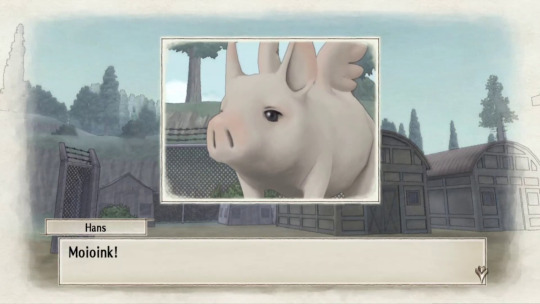
It's an amalgam of white and black without any gray: It exists on extremes, and it never intersects, it's playing two parallel lines and coming to terms with the fact that you'll never see cohesion but that somehow enhances the end product in ways evidently no one intended. You have narrative comparisons with the persecution of jews and, at the same time, the game ends with the bad guy getting German Suplexed.
But I think the funniest aspect of Valkyria Chronicles The First is that the main character is the farthest thing from a war hero they could possibly muster with the expertise of a stoic Japanese swordsmith from the mountains crafting a god-cleaving blade: Welkin.
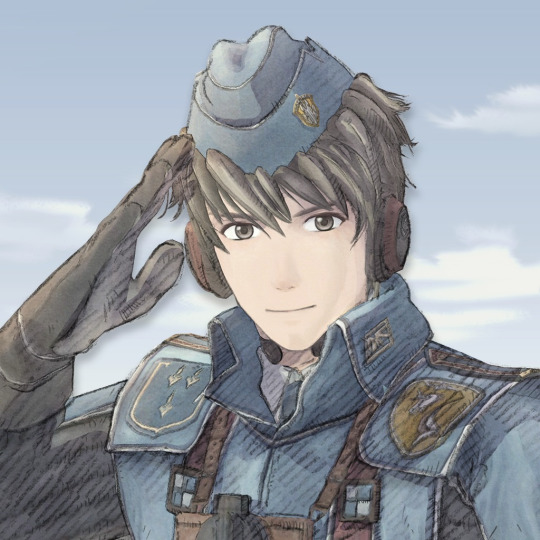
This Scout From TF2 Put Through An Anime Filter looking mother fucker was chilling in his hometown talking about how much he wanted to be a teacher and showing people his really good sketches of animals because he's also a gifted artist, when suddenly, the Dudes attack, and his reaction to the Dudes attacking is "hang on, I recall my dad hiding his actual service tank in the shed in the back" so he goes and, yeah, his dad's tank from a previous war is just there, chilling, so he takes it for a joy ride while the town baker, Alicia, armed with a rifle and infinite action economy due to the afore mentioned flawed gameplay, sweeps the entire god damn platoon of heavily armed machine gun troops.
The entire game is Welkin using his love for nature and his baker love interest to inflict insane personnel and materiel damage to an entire empire: Welkin and Alicia will come across a heavily fortified bridge, and the dialogue will go something like
"Welkin! They will pulverize us with the heaviest machine guns known to man if we step one foot in that bridge! They practically developed wooden low-orbit bombardment stations! What's the plan!"
"Well... Look at that duck over there. It's flying from the east to the west, right? Well, YOU SEE, that duck is known as a Balkunese Socioduck, and those, during this season, migrate from west to east, and they only exhibit this irregular flight path if a Matrisgel Weasel family is molting by the juniper berry bushes, their favorite food. Matrisgel Weasels only ever molt if they are put under the exact amount of stress caused to them by the sound of distant tank threads on the road, and they are known to hide in sturdy, stable soil."
"Welkin, SIR, what the fuck does this all mean?"
"If we follow the smoldering shrieking of the molting weasels, we'll find a SECRET PATH that will, as always, let us ambush, flank, and surprise our foes! Alicia, you know what to do."
"Ogggeyyyyy"
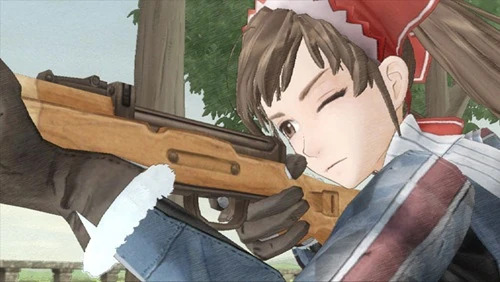
and then, invariably, no matter the level, thanks to Welkin's impressive knowledge of fauna and flora, and Alicia's literally infinite action economy in a game that wasn't properly beta tested in-house during development, they combine their powers like a piss poor Captain Planet and kill the absolute shit out of an entire Empire's worth of dudes, and it's legitimately one of the most fun and charming games you'll ever touch if you remember to not take it too seriously. I fucking hate Hans but I love this game.
367 notes
·
View notes
Note
HELLOOOOO would love to know about human incarnate. AND history's flowers. AND 13 for the fic writer questions. goodbye
OKAY OKAY OKAY IM SO EXCITED I LOVE THESE FUCK ASS THINGS!!!!! let me divide them….
13) your strengths as an author
i love writing prose. imagery my betrothed. connecting tiny threads into one useless piece is my bit on the side. basic dialogue when ik what theyre gonna talk about, but making it SOUND like them is a wholeeeeee other ordeal. so yeah, i'd say Prose. i like those, and people have said i use good word :)
history’s flowers
so you know the song bouquet by itchiko aoba ? well a good chunk of the song is mainly flowers, so ended up a fic like “crowley and aziraphale through history, but a flower that is mentioned in the song is present in an encounter we see”. like ‘plumeria’—its a ficlet in the garden and a bush of plumerias happens to be nearby or part of the scene ! its mostly chrono, but i tried to keep it as close as possible. not too much has been written yet other than the garden of eden example i gave you, and there’s a lot of flowers, but im gonna dew it all 😌
human incarnate (under cut due 2 length)
okay THIS one’s a bit more complex and infinitely longer. its a reincarnation story ! but of course, not exactly what you might have seen before. now, bit of context, i’ve mever really liked human aus—they are some amazing works out there and i’ve read a good chunk dont get me wrong, but its not exactly something i seek out—im there for the mystical, the immortal dance, etc etc. but one day this story just came up, and i COULDNT let it go. so: human aziraphale and crowley trying to stop the apocalypse but theyre actually an angel/demon duo but reincarnating every few decades. so one day they died (this if ofc plot relevant but if i explain it its ANOTHER long ass paragraph, so lets just say it involves fire and one of my favorite historical events *not alexandria*), and they started incarnating together, some lives never meeting and others meeting once or others changing them entirely, only to eventually truly converge in the present day (like 2008) in time for heaven and hell to realize the trick and the apocalypse on the brink of beginning. easy no memory shtick and stuff, and the appeal is 1) trying to stop armageddon without their respective powers/knowledge, and 2) relearning their love story one life at a time. its the exact balance of Supernatural and Human i would love to read, but never have seen. there might be fic like that out there (and i’d love to read it) but this is hopefully something I can execute nicely. some highlights:
- raising warlock is a such a funnier ordeal becayse they dont have powers to help them out. its a DISASTER
- them figuring out their miracles and their limitations when their powers slowly start tricking back (they're not yet where they're supposed to be, but after heaven and hell's first contact, they arent exactly human anymore, are they?) like warlock's birthday ! its just funny to me..
- crowley and aziraphale's limited contact before armageddon is about. its just a neighborhood crush, nothing more, but then it escalates like THAT ? imagine the guy who curates your flower bouquets you bring to your grandpa's grave (he's not related to you) (and he also happens to be you) and looks kinda pretty ngl is actually your immortal enemy you've been locked in a homoerotic relationship with since the beginning of time. and is a DEMON. of HELL. woah
- hell and heaven don’t really frighten aziraphale and crowley most of the narrative, until the plot ramps up. at first, theyre just Fuckin Weird to them, and seeing a few chapters of them just ridiculing their HEAD OFFICES without knowing just how powerful they can be makes me crack up
- crowley's tattoos (including the snake, which he has NO IDEA where it came from)
- aziraphale's bible and prophecy collection (inherited from his grandpa) (whom he is not related to) (who is also him)
- theyre both trans. one cool thing about this is that aziraphale intentionally chose his name based on the angel who guarded eden, which is HIM. for some odd reason, his name never did fade from the bible editions, and he is still known to this day. Cough Cough Crowley Cough Cough anyway also he and crowley both cycled through some other names before reaching their final ones, which are all names they’ve had in past lices :) because while their past lives have been connected to their old identities in some ways, it wasnt until 2008 where it really became similar. its almost like they knew things were coming…..
- (this trans fact is revealed during the six hours of drinking after adam is delivered <3)
- the bookshop fire
- holding hands at the end of the world
- no stars to run to, because crowley doesnt even know he built that one. but he still fucking loved astronomy anyway!!! he used to want to be an astronaut, you know. before the world tore him down
- aziraphale, on the other hand, never knew what he wanted to be. Good, that he knew, but Good at what?
- all of the fcuking.... scenes.... hittinf anathema, tadfield manor, I JUST!!!!
- some of their cliched past lives being the following: pirate/naval captain, bodysnatcher/cemetery caretaker, brandy spy/allied bookseller, 17th century witches, fugitive/aristocrat, and ofc, present day: struggling florist/bookseller who doesnt really sell any books and lives off of his grandpa's fortunes (again, not related) (who is also him)
- crowley growing up on the velvet underground and aziraphale growing up UNDER A ROCK. queen plagues them both...
and yeah ! its gonna be pretty long, i think. thanks 4 the ask, and happy timezone 💗
10 notes
·
View notes
Note
12, 22, 69 (lol) for the fanfic ask game 👀
SCREEEEEEEEE HERE WE GO
12. Do you outline your fics? If yes, how detailed are your outlines? How far do you stray from them?
It's an even fifty-fifty. I outline my fics when I begin to have a lot of plot elements, narrative threads or allegorical references I want to work into it - if I don't, I'm liable to forget something relatively important and have to either shoehorn that thread in later, or do the Edit Of Shame where I go back and include something as a throwaway line. If you're curious as to what they look like, here's an example from when I was working on Formulas Fatal To the Flesh:
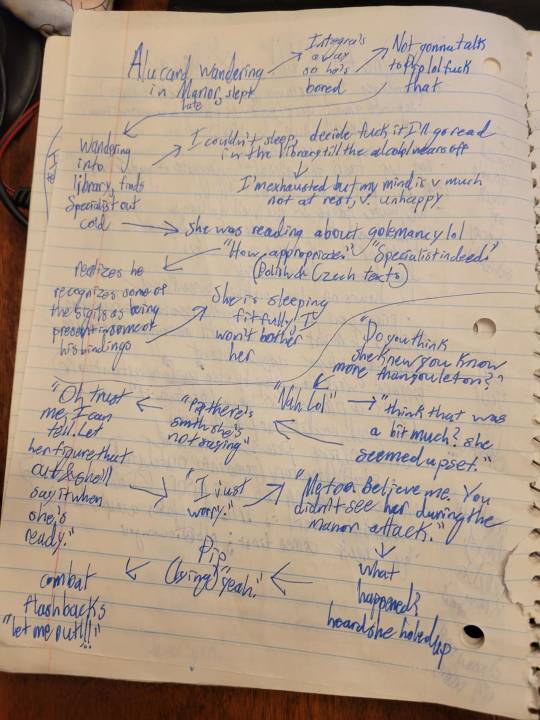
Some of these beats ended up in the final cut, while others didn't. I usually try to break it down based on "okay, what is The Moment I want Character X and Character Y to have together" and from there I build backwards and forwards. How they got there and where it takes them - I'll often keep a "scrap heap" of ideas or lines of dialogue (especially with Zemi since I entertain the fuck outta myself with writing her inane bullshit one-liners) on a spare sheet somewhere that I will pull from to weave into the story. This does look a bit like a mad scientist's scrawlings, and I like it that way! My trick is to outline and be thorough about it but not get too rigid. This is why I typically only plan fics in chunks at a time, with general ideas of where I want the story to go. Stories morph and evolve as one writes them, and I am the type who KNOWS that if I make the outline too demanding and rigid I'll get all up my own ass about it. Outlining too hard and trying too viciously to stick to it tends to shoot me in the foot so I avoid it.
Additionally, I particularly enjoy structuring stories based on conversations. Dialogue is often the first thing I write, and the rest comes after that. This comes from my background studying theatre - a thespian scholar bitch like me knows better than anybody that you can build a whole world around little more than a few words between two characters, so I like to let the rest of the work bloom from that organically. Not always, but these are common methods I use.
22. Do you title your fics before, during, or after the writing process? How do you come up with titles?
Fuck yeah so glad somebody asked this one. I develop titles for chapters after I'm done writing them. I make it a point to title pretty much EVERY CHAPTER I WRITE for everything I've written publicly so far based on the title of a death metal track or album. I'll branch out into other genres like black metal and whatnot but I try to stick to death metal specifically. This mostly comes from my personal annoyance that there's so little decent media content based on extreme metal. Part of why I love Hellsing so much is just based on the fact I think it gets the closest to the aesthetic of the deepest bowels of extreme metal in its art style, themes, visuals, and so on. So when I need a new title, I deadass will just leaf through my music catalogue and pick a title I think fits the themes of the chapter in some allegorical sense - ditto for the little lyrical blurbs I put at the front of each chapter. Is it corny? Fuck yeah, man, but so am I. Sometimes I just say "fuck it, I'll put TWO songs names in the title, who will stop me?" When it comes to the entire fic titles, I put more thought into it and play process of elimination until I settle on one I think rolls off the tongue best. See: Formulas Fatal to the Flesh (Morbid Angel), Lesions of A Different Kind (Undeath), etc.
69. What are your favorite fics at the moment?
Aw shit man, puttin' me on the spot as I've been off my fic reading game for a minute but I'll plug what I can remember!
First off, shout out to the homie @neet0 with their work Revelations. Absolutely love this piece, I reread chapters from it a lot and feel like I learn something new about writing every time.
I'm also really into this My Hero Academia fic, In The End (We Are Left Bereft). Only halfway through, and some of the elements may not be for me personally, but first of all, anything that examines Bakugo as a closeted trans woman is gonna make me come running because I just ADORE that as a concept. Second, the issues this take on Bakugo deals with regarding identity and belonging, being touch-starved and alienated, etc? A bitch relates, what can I say. Good MHA fics are so hard to find in my experience so this one has been a delight to read thus far.
I also eat up almost everything that BirdOfHermes ever does. Because, listen mate, sometimes a bitch just wants that sweet, sweet cheesy wish fulfillment with fictional men. That, and their writing is so easy to read for me that it hooks me into stories about characters from series I haven't even watched or read. Never thought Harry Dresden would be hot to me, but, oops, they made it happen. Also, forever awaiting the glorious day they decide to finish Tame. One of my favorite Alucard/Reader fics of all time, I've reread it probably a dozen times by now.
Beyond this, I've been in a bit of a fic rut as of late, so if you got recs, send them my way!
Thank you so much for the ask it made my day for real <3
2 notes
·
View notes
Text
Recent Reads!
Started: November 18, 2024
Finished: November 21, 2023

The Only One Left by Riley Sager
Four and a half stars!!
⭐️⭐️⭐️⭐️
This book absolutely stunned me. I thought I had it figured out, and I did- partially. The real twist(s) took me completely by surprise and my jaw was dropped for the last few chapters. I admit I was also borderline in tears at the end. I truly enjoyed this book, it's such an engaging and enjoyable read. I will definitely be looking into other books by Sager.
I honestly really, really loved this book! I saw it at Target and based on the little blurb my initial thoughts were that it was giving 80s slasher vibes. I have never been so happy to be wrong! There was quite a lot of suspense and thriller elements; super heavy on the mystery of it all too. I enjoyed the character development and the pacing of it. Initially, I didn't love the type writer additions but as the story progressed it made more and more sense and all flowed together more.
The ending definitely took me by surprise! I loved the last page so much, it really felt like a complete story and I don't feel like there were many- if any- loose threads.
This will definitely be on my reread list in the future, and I've already recommended it to several other people who have also loved it!
⚠️SPOILERS BELOW⚠️
I came to the conclusion that "Lenora" was really who she was said to be at the same time as Kit but I was just as shocked as she was! What I was NOT expecting was the mrs baker reveal. That was a complete twist to me and I LOVED IT. I think my favorite chapters were when the original murders were fully fleshed out.
The revelation about Kits father also totally blindsided me. It didn't feel like it came out of nowhere because we didn't really see a lot of him- but what we had seen totally clicked and I felt like I was going through it with Kit when she pieced it all together.
I really loved the ending when Virginia and Jess (!!! totally caught off guard again) ran away together and mailed a letter back to Kit. I think had the letter not been included I would have been left entirely unsatisfied.
The last page with the obituary for Virginia Hope absolutely gutted me, not gonna lie. I had tears forming- like I knew she was old but to me she was gonna live forever.
I loved that Kit was a close friend of hers until the end, they really bonded and grew close throughout the whole book and knowing that they continued to grow together after the narrative end really brought it full circle for me.
I love what a full picture we gain of Virgina in just a handful of pages- after a novel (and lifetimes) worth of her being presented as someone else.
#annie talks#mostly to myself#studyblr#history studyblr#art history#studying#history#study motivation#student#history student#reading#books & libraries#barnes and nobels books#bookstagram#books and reading#booksbooksbooks#recently read
1 note
·
View note
Text

So I saw this tweet today, and I think the question this person poses is actually a very interesting jumping off point for analysis. I absolutely refuse to make a 100 tweet long thread about this though, so here I am, typing out my thoughts on a platform without a character limit.
(this is all /dsmp /rp, unless otherwise specified all names refer to characters, not content creators)
I wanna start off by saying that I am NOT what I would describe as a “Dream anti/hater.” I’m a MASSIVE enthusiast, he’s easily one of my favorite villains in any piece of media I’ve ever consumed, precisely because he is a smug, over-the-top asshole who will stop at absolutely nothing to get his way. It’s incredibly fun to see his antics in action, and immensely satisfying when he finally gets his comeuppance.
I’m going to first delve into the second question: what makes Dream different from other villains in other pieces of media?
Well, he’s not, not really. The way he acts and carries out his plans is unique to his character of course, but the role he fills in the narrative and the way he plays that role is a pretty common archetype, though one that has fallen a bit out of use as of late.
Dream is a Pure Evil Villain.
The video I’ve linked goes into WAY more depth, but the basics of the PEV archetype is that they:
Have no backstory (at least not one that’s relevant to the plot).
Have very simplistic goals (i.e. taking over the world, retribution for perceived slights, or just wreaking indiscriminate havoc).
Have motivations that are purely self-serving, and they’re having a lot of fun carrying them out. (That said, some PEVs had complex motivations once upon a time and may have been full-on good guys, but have long lost sight of their original goal.)
Have an unwavering sense of self-confidence, and a MASSIVE ego.
End their stories with a third-act breakdown (or as TvTropes refers to it, a Villainous Breakdown, which is a term I’m gonna keep using here because DSMP doesn’t have a three-act structure), where they crash and burn in spectacular fashion as the hero finally comes out on top.
Dream ticks ALL of these boxes.
He has no backstory or even a point of view, and even if he got one, it wouldn’t change much about how we perceive his character. We can glean his goals, motives and personality pretty well from his interactions with the people around him.
His goal is literally just “control the entire server through any means necessary,” which is why he goes to such lengths to crush his political rivals, break Tommy’s defiance against him, and create a giant fuckoff prison to throw major threats into.
He’s stated multiple times that he enjoyed watching L’Manburg get destroyed, was laughing and telling Lazar “this is the best part” while destroying Tommy’s armor in exile, and tells Tommy and Tubbo he’s “playing with [his] food, that’s the fun in it” after they lose the initial battle of the Final Disc War.
He’s nothing BUT self-confident. I cannot remember a single moment where he doubts himself or has a moment of introspection, and an insult I’ve never heard Tommy use for anyone except Dream is “egotistical bastard.”
His villainous breakdown happened at the end of the Final Disc War, when he was suddenly made powerless, none of his manipulation tactics worked anymore and Tommy was actively beating him to death. He ended up huddling in a corner, begging and bargaining for his life, before being thrown into his own prison.
(Sidenote ‘cause I know it’s gonna get brought up. Dream has claimed he just wants the server to be a happy family twice, but the context of the scenes make it obvious that you’re not supposed to take that line at face value.
The first time he said it, he was talking to Punz, his only ally at the time, while standing in front of the prison he commissioned, helped design and helped build. During that same conversation, he claimed the prison was only for the most dangerous people on the server… but also that it had twenty cells, and a main cell that could fit multiple people, when the server’s population at the time was about thirty. This conversation also took place right after Tommy ran away from exile, meaning Dream was saying this knowing he’d abused and wanted to continue abusing a sixteen year-old boy to the point where he attempted literal suicide.
The second time, he was talking to Tommy in prison, right after Tommy told him he wouldn’t be visiting him anymore, and Dream was desperately trying to change his mind by claiming he could change as a person if Tommy kept up his visits. Tommy’s response says it better than I could.

Dream’s actions speak louder than his words. He can claim he just wants a happy family, but when he’s cut off, abused, kidnapped, killed, tormented and blackmailed the people he’s supposed to care about into compliance, it becomes pretty obvious that if you don’t fit into HIS image of a happy family, you need to be locked up in a tiny box or dumped on a remote island and beaten until you’re so broken you will just do whatever he tells you to without question.)
Now, if you have a shitty literature teacher, they’ll tell you that villains NEED to be morally grey, have complex motivations and a chance at redemption, otherwise it’s bad writing. However, that’s not true. Some of the most iconic villains of pop culture are PEVs, like Bill Cipher, or Megatron, or Moriarty, or literally any classic Disney villain. It’s not bad writing, it’s just not fashionable right now. Just because other villains in the narrative ARE morally grey, doesn’t mean Dream needs to be.
It’s also become popular nowadays to have a PEV AND a sympathetic, redeemable villain working together, most often with the sympathetic villain serving under the PEV. Zuko is sympathetic and redeemable, Ozai is the PEV. Gideon Gleeful is sympathetic and redeemable, Bill Cipher is the PEV. Catra is sympathetic and redeemable, Hordak is the PEV. Nebula is sympathetic and redeemable, Thanos is the PEV.
This allows writers to have the best of both worlds; it allows for the emotional journey and incredible character development that comes with a really good redemption arc, while also having the flair and pizazz and unbridled charisma and catharsis at seeing them crash and burn that comes with a PEV. Some writers try to have both in one character, but that rarely ever goes right (like how Thanos’s goal of wiping out half the universe is supposedly to prevent overpopulation while keeping biodiversity, yet he also killed all the dwarves and tortured Eitri for no reason).
Whenever Dream teams up with another villain, he’s ALWAYS taking the PEV role.
When he teamed up with Wilbur for November 16th, Wilbur acted the way he did because he was mentally ill, suicidal and severely paranoid, convinced nobody wanted or needed him, that everyone secretly hated him, that betrayal was just around the corner, and that he was the villain of his own story. He destroyed his own creation in a fit of anguish, before committing suicide by proxy. While his behavior is largely unchanged after his revival, it’s clear he is still in a lot of pain, and there is a lot of setup for a redemption arc for him. Dream, meanwhile, fought on Schlatt’s side, egged Techno on through whispers as Tubbo was being sworn in, screamed the loudest “YES” I’ve ever heard when the TNT went off, then proceeded to place more TNT and attack everything in sight while Techno went on his rampage. When everything was said and done, he even ran over to Tommy’s house and blew that up too for good measure.
When Dream teamed up with Techno and Philza during Doomsday, Philza was clearly convinced L’Manburg was the cause of all the pain on the server and that destroying it would be the right thing to do, and used its destruction as an outlet for the grief he carried over the death of his son. While his target was misplaced, you can see how he came to the conclusions he did, and how his own biases, prejudices and boomer-ish “I am older and have more experiences therefore I’m always right” attitude cloud his judgement. Dream, meanwhile, outright admitted that he decided to destroy L’Manburg instead of burning the discs because it was just more fun that way, and said some DISGUSTINGLY creepy things to Tommy on the grid. We also know that, after Techno and Phil already left, Dream stayed behind and rained TNT down for days.
(I didn’t mention Techno here because I would argue that, in the context of Doomsday, Techno also classifies as a PEV. That’s a discussion for another time though.)
The Final Disc war, in my opinion, PERFECTLY illustrates Dream’s pure evilness. He describes himself and his actions as evil multiple times, acts completely in his own self-interest, is MASSIVELY overconfident until he’s thwarted by Punz and co, and he is, of course, having an absolute BLAST with his reprehensible actions.
Which leads me into the other question: what makes him irredeemable?
PEVs are irredeemable pretty much by definition. The combination of selfish motives, massive ego and lack of introspection makes for a character that’s EXTREMELY allergic to character development, and character development is pretty much the point of a redemption arc. It’s a MASSIVE shift in a character’s goals, ideals, morals and sometimes personality, brought on by massive amounts of introspection and self-doubt, and that’s just not something a self-assured, egotistical person who KNOWS their goals are selfish and evil and enjoys it would ever really do.
The only PEV I’ve ever seen get something resembling a redemption arc is Hordak from the She-Ra reboot.
(SPOILERS)
In season 3, Hordak meets Entrapta, a princess working for the Horde with a scientific mind just like his. As he bonds with and gets romantic feelings for Entrapta, he slowly starts to open up to her about his past, his struggles with his physical health, and how he just wants the approval of Horde Prime. When Prime eventually arrives however, his achievements are waved off, he’s deemed defective due to his physical illness, and has his memories erased. He’s eventually used as a replacement body by Prime, before openly defying Prime and hurling him off a cliff.
Thing is though, it’s not a redemption arc in that he’s instantly forgiven, or even that he’s a good person now. The princesses (sans Entrapta) look visibly uncomfortable or afraid of him, and Mermista even outright asks if anyone is gonna say something about Hordak being there during the big end-of-series celebration. Hordak defied Prime, but he’s not automatically a good guy, nor is he treated as one.
(END OF SPOILERS)
The most important point is: as soon as Hordak enters his redemption arc, he stops being a PEV. His backstory is suddenly integral to his character, his self-confidence turns out to be a farce, and while his motives are still self-serving, they’re much more complex than the generic take-over-the-world villain he was before. A redeemable PEV can’t exist, because as soon as they start redeeming themselves, they cannot continue being pure evil.
Dream has shown to be completely allergic to character development. No bargain with him has ever worked to his detriment, nobody can reason with him because he’s so set in his own ways, and he has never shown any kind of remorse for his own actions. The only person he’s ever apologized to is Tommy, and you can tell from his tone and the way he refuses to even mention specific events that he’s sorry for that it’s purely performative. Any redemption arc NEEDS to start with a villain examining themselves, or feeling remorse for their actions, or questioning their position. Dream never does that, HAS never done that, and it’s looking like he never will.
However, if you’re looking at specific actions that make him irredeemable, there’s one event that pushes him over the edge.
Because sure, some villains have tortured people, have killed people, have committed acts of terrorism, and still received redemption arcs (though there’s usually some level of coercion involved so they cannot be held 100% responsible, like they were brainwashed or acting on someone else’s orders).
There is, however, a line. TvTropes refers to this line as the Moral Event Horizon, as like with the event horizon of a black hole, once you pass it, there is no going back. Where that line is is kind of subjective, it depends on the narrative weight placed on the event, the cultural standards of the audience, and in part, the personal opinion of the viewer.
But I don’t think it’s a controversial statement to say that Dream passed the Moral Event Horizon with Tommy’s exile.
I don’t know if you’ve watched exile live, but as someone who has, I can tell you that it was fucking GRIM. People had to stop watching the streams entirely or wait for people to post trigger warnings and summaries on Twitter and Tumblr before watching the VOD, because it was legitimately triggering to some. AO3 was full of fics of Tommy being pulled out of Logstedshire by other people on the server (mostly Techno and Phil) a trembling, traumatized husk of his former self, and those were the OPTIMISTIC ones. There were jokes about Tommy’s chat getting traumatized with him, as they were constantly telling him to run, get away from Dream and hide his armor, and whenever “Dream joined the game” appeared in chat, everyone’s stomachs collectively DROPPED. The general mood in the fanbase was one of helpless panic and terror as we watched this kid be slowly destroyed in front of our eyes through physical, emotional and psychological abuse, gaslighting, and isolation. Hell, exile is the event that sparked the creation of the c!, cc!, /dsmp and /rp tags, because people didn’t want sentences like “what Dream is doing to Tommy is abuse, this is actually horrific” to make it to the wider internet without any kind of context.
Exile is one of the most narratively heavy events on the server. It changed Tommy and Dream’s relationship status from “friendly rivals” to “abuser and victim,” and completely destroyed any sense of friendship they had left after November 16th. It’s permanently scarred Tommy to the point where even now, nine whole months later, he still has self-esteem issues, depressive episodes, flashbacks, panic attacks, suicidal thoughts, and a pervasive fear of Dream breaking out of prison. It’s one of the most realistic portrayals of abuse and trauma in fiction I’ve ever seen, and it is HARD to rewatch.
But most importantly, the vast majority of people who thought Dream was in the right at the time dropped that IMMEDIATELY as soon as it became apparent what exile was REALLY about. I have a friend who was a huge sympathiser/apologist for L’Manburg and Pogtopia era Dream, but who refuses to even CONSIDER defending anything related to exile. The points about exile not being that bad, Tommy deserving it, or Dream trying to help him somehow didn’t start cropping up until MONTHS after exile ended, when memories of the events had been warped by time, fanon had blended with canon, and the horrific details had faded in most people’s minds.
There are very few outright abusive characters who have gotten redemption arcs, and those arcs are often reviled by fans. Abuse, child abuse especially, is one of those actions that make you completely irredeemable as a villain, like torturing someone purely for fun, or killing babies, or kicking dogs. Ozai’s establishing character moment is a flashback where he burns his son’s face off and exiles him for speaking out of turn, and the show makes it clear you’re not supposed to see that as anything EXCEPT revolting.
There is nothing Dream’s POV could show us that would make what he did to Tommy acceptable. There’s nothing he could say or do that would make exile okay. Exile is as low as he could morally go, and the fact that he not only has shown no remorse for it, but even seems to remember it fondly makes redemption impossible for him. What could he do that’s worse than exile? What would prompt him to feel any semblance of guilt or shame if exile didn’t spark it?
When you isolate and abuse a sixteen year-old boy, clearly have fun doing it, and feel not a single shred of guilt in the aftermath, you’re not gonna get a redemption arc, because that’s just not the kind of character you are at that point. Redemption arcs are reserved for sympathetic villains and fallen heroes, like Zuko, like Catra, like Wilbur. Even Hordak, who got a redemption arc, wasn’t an actual PEV in the end. He was a sympathetic villain in disguise, and as he shed the mask of pure evil and got some character development, the role of PEV was passed to Horde Prime.
The reason villains like Ursula, Maleficent, Bill Cipher, Cruella De Vil and Jafar are so fun to watch is precisely BECAUSE they’re unapologetically evil. The biggest criticism the live-action adaptations of Maleficent and Cruella received is that they strip that away from the characters to make them sympathetic and redeemable, and therefore - ironically - a lot more bland.
Dream’s pure evilness is what makes his character so much fun to watch. Giving him a redemption arc now not only wouldn’t make sense narratively speaking, it would actively strip away the aspects of his character that make him such a good villain! People don’t watch a PEV to see them grapple with their morality, they watch them to see them fuck shit up! A true PEV needs to be stripped of everything that makes them cool and interesting to their audience in order to even BEGIN thinking about redemption.
You can even see this happening in the way Dream is retroactively made to be more sympathetic by his apologists. There’s this running joke in a Discord server I’m in that Fanon!Dream is a fucking pussy, and that Canon!Dream would wipe the fucking floor with him, and I can’t help but agree.
There’s an idea going around that Wilbur manipulated Dream into becoming evil, that he constantly called Dream a tyrant and a dictator, and that Dream was so upset by this that he started the L’Manburg War. Except, not only does this have no basis in canon, it kinda makes Dream look pathetic, doesn’t it? Canon!Dream is a tyrannical control freak who saw some people make an area where his rules didn’t apply and decided to beat it into the ground to once again rule undisputed, not caring who he hurt or killed in the process. Fanon!Dream started a whole war because Some Guy he’d canonically talked to maybe twice and his annoying brother called him mean names.
There’s also the idea that exile needed to happen, because Dream saw that Tommy was such a destructive asshole all the time that he posed a massive threat to the server. Except… Tommy is absolutely not the most destructive person on the server. He’s loud and annoying, sure, and he could be destructive, especially in the early days where he often vandalized people’s stuff for fun. But… it never got worse than that. Was a teenager swearing at people and doing petty vandalism really such a massive threat to the server’s apparently paper-thin integrity that he needed to be taken away for everyone else’s safety? Or was it the fact that Tommy constantly called Dream out on his bullshit, refused to concede to his terms, questioned his authority, and encouraged other people to do the same?
Making Dream heroic also warps every single character around him, making them all unreasonably cruel to Dream specifically. Wilbur made him a villain for Reasons and was always a controlling chessmaster manipulating everyone around him (honestly it’s like their entire personalities switched places here). Tommy is a rabid animal only capable of destruction who needs to be kept on a leash for everyone else’s safety. L’Manburg is a xenophobic, colonialist, other buzzword empire. Sapnap and George left him because they’re bad friends, and not because he continually betrays them, uses them, disregards their wishes completely, and does nothing to refute Sapnap’s claim that he doesn’t care about them. He doesn’t deserve to be in prison, despite the fact that he murdered a bunch of people, abused a child, committed multiple acts of terrorism, and got caught red handed trying to murder a defenseless teenager while his friend watched and having a vault with everyone’s most valued possessions for blackmail purposes. Oh and did I mention the Skeppy cage?
A redemption arc for Dream would not only open up some really uncomfortable cans of worms (like Tommy suddenly being expected by fans and other characters to forgive and be nice to the man who made his life a living hell for months), it would be an active detriment to his character, because it strips away everything that makes him interesting in the first place.
If you want to watch a complex character going through a slow, painful redemption, go follow Wilbur’s storyline. If you want to watch a morally good man get beaten down by the world over and over again until he’s willing to go to even the most heinous lengths to secure his own safety and happiness, Quackity is right there. Let Dream be the guy who fucks shit up without remorse. Wilbur and Quackity can handle the emotional conflict and slow, painful spirals and roads to recovery, Dream can give us the explosions and villain speeches and the stomach-dropping terror whenever he appears on screen.
Anyway that’s my hot take, thank you for coming to my TED talk.
1K notes
·
View notes
Text
SO’s US Book Tour : Alabama

Fried Green Tomatoes at the Whistle Stop Café
By Fannie Flagg
When I decided to start reading my way through the United States, it seemed obvious (and perhaps boringly so) that I’d just go through the list alphabetically. And when I started researching which book I’d like to begin with, there seemed to be a lot of good choices -- specifically, the most famous (possibly) of Alabama fiction - To Kill a Mockingbird - which I, and everyone who's been through a US high school English class has probably read. A lot of the books I came across felt a bit heavy, and I wanted to start this journey out on a somewhat lighter note.
The reason I kept coming back to this one was that every blurb seemed to mention that it was about fun and friendship and sometimes murder, and I’ll be honest, that last bit paired with the praise of comedy did pique my interest. The murder ends up not being so funny, but the book ends up being far more fascinating than I originally thought it would. I didn’t know much about it when I started -- only that I had heard of the film but being too young for it when it came out -- and no one in my life ever talking about it, I hadn’t sought any information out about it.
The book splits its time between time periods, which sort of reminds me of Forrest Gump (another Alabama based book), with an old lady sitting on a bench telling her life story, and the story of a small town close enough to Birmingham Alabama to eventually be swallowed up by the urban sprawl; mixed with a bit of that pro-women narrative of something like a League of Their Own. But unlike Forrest Gump, whose narrative is mostly built on nostalgia for a time long gone, Fried Green Tomatoes still has themes that can resonate today.
Set in the present day of 1987, Evelyn Couch is a middle-aged woman who doesn’t know what to do with her life. She’s lived her life entirely by the book, and according to how women should act and be. But one day she goes to visit her mother-in-law at a home when she meets Mrs. Threadgoode (Ninny) who begins to tell her long tale of the town of Whistle Stop and all of its residents -- most notably the Threadgoode and Peavey families -- those closest to running the cafe. I really loved Evelyn’s arc in the novel. She starts out being this really sad sack of a woman who is lost and lonely. And Ninny provides her with an actual friendship, something she’s lacking completely, and helps her turn her life around.
It’s fascinating looking back at the late 80s, where Evelyn is slowly starting to come into her own as a woman in her late 40s, but still somewhat confined by the fact that the 80s still had their own slew of issues regarding women. Evelyn begins to push back on all of it -- and while clearly, now in the 2020s, women are still fighting, but we’ve come a long way since 1987.
Still, it’s nice to see Evelyn grow as a person and a woman, and the fact that a friendship - and specifically a friendship with another, older woman - is nice to see. Too often women are portrayed as young and competing, and the fact that this novel seems to celebrate the friendship of women, especially at different ages, and especially between older women, seems like such a thing of value. Going with the theme of age -- I also like that it portrays women over 40 having interests and hobbies, and explores the idea that women’s lives don’t end if they get married and/or have children.
The main crux of the story, however, revolves around the Threadgoode family -- most notably Ninny’s sister-in-law Idgie, a young woman who has tomboy-ish characteristics and could give Huck Finn a run for his money. The thing about Idgie, however, and something that I was not expecting -- at ALL -- was her relationship with Ruth Jamison. They’re lesbians, Howard. The relationship is not explicit in any way, but it’s not subtle either. Idgie and Ruth both declare their love for each other in romantic terms, and end up spending their lives together running the cafe. I was not at all expecting a story about a couple of lesbians in a book about small town Alabama in the 30s, and yet, here I am, pleasantly surprised to see it as one of the threads. I do wish there had been more defining mentions of it in the book, but for 1987, I think it’s rather bold to have it at all be the main love story in the novel.
For what it’s worth, doing some research, I found that Fannie Flagg is a lesbian, so it’s nice that her voice of experience was able to help create such vivid characters. The fact that Idgie and Ruth have a lesbian relationship is somewhat known by others, but never really commented on. The book idealizes it a little -- but it can be passed off as a great friendship well enough that it retains believability. If anything, my one nitpick would be that it falls into the narrative of ‘kill the gays’ with death of Ruth cutting her life short, but since her death isn’t the end (it’s hinted at early on), nor does it prop up anyone else’s emotional story -- but is another part of the ‘spanning a lifetime’ part of this epic tale, I’m letting it slide a bit.
The book does go in-depth on the whole Threadgoode family, and what life was like during The Great Depression in small town Alabama, and how small town life changes as the years tumble into the 50s, 60s, and even 70s. People come into your life, and people leave it, and the world around you changes as you begin to romanticize the time of your youth.
A bit of the book is also dedicated to talking about the Peavey family -- a black family who works for Idgie at the cafe. I wasn’t sure how the race angle was going to play out, the term ‘colored’ and the n-word are used judiciously -- but used in the context of the time period. While there were times when I could tell it was definitely a book written by a white woman, the book never shied away from the difficulties black families had (and still have) in the south. The nice thing is that the black characters were just as complex, just as fleshed out, and just as interesting as any of the white characters. They weren’t caricatures or stereotypes -- they were people just trying to make it through life the same way white people were, only with a lot more difficulty.
While the book kind of acts like a slice-of-life character examination -- it does have a major set piece in the murder of Ruth’s husband Frank, and who did it. The mystery is not anywhere near the focus of the book, but all the threads of the book seem to tie around that one incident. This is where I really enjoy Flagg’s storytelling. At first the book bounces around from one piece of narrative to another, but the unfolding of why and how and what of this murder mystery buried within the character study is really a thing of beauty.
Before I forget, the heart of this book is a celebration of southern (Alabamian) culture -- and one of my favorite aspects of this book is the fact that there are over a dozen recipes for good ole fashioned southern cooking in the back. Food is another theme throughout the novel, and it just makes me smile that like any good southern household -- they can’t let you leave still feeling hungry.
I really enjoyed this book -- much more than I thought I would when I picked it up. There’s a lot packed into the 250-ish page book, and handles the themes it presents rather well. It’s an easy read, and while light in tone, doesn’t shy away from its heavier subject material. I would very much recommend it!
36 notes
·
View notes
Text
The Problem with Season Five
this is already going to have a lot of you in the replies yelling at me. obviously, massive SPOILERS for s5 of she ra and the princesses of power if you haven't already seen it.
okay, so She Ra is definitely a kids' show, but it has a lot of themes aimed towards an older audience: abuse, war, found family, destiny and knowing who you are. I loved She Ra because it made me feel empowered, made me feel seen. after this last season, however, I don't feel the same. I will, however, talk about what it did well.
What She-Ra s5 did RIGHT
I very much enjoyed seeing the character development for most characters come to the forefront here. For example, SW returned to her original motivations. When she lived in Mystacor with the other sorcerers, her thirst for power was borne of a desire to fight the Horde. When she was rejected, then she chose to do what she did. We see a return to that in s5, where she takes a stand against Prime by enlisting Castaspella to stop her if she tries to take any power for herself. She ends up just wanting to help, to do what she can, which was excellent. Glimmer, Bow and a bunch of other characters are given some love here as well. I especially enjoyed seeing Bow and Mermista take on leadership positions in the absence of Adora; it was an excellent look into another facet of their personalities.
Character interactions in non-serious moments were, for the most part, good. Swift Wind and Scorpia being bros was not something I knew I needed but something I want more of. Netossa basically being Batman and knowing the weaknesses of everyone around her was great and an iconic scene. Bow thinking Catra was super adorable was also an excellent moment in the season and I could watch 9 more seasons worth of that. Something that surprised me was Entrapta's "not good with people"-ness being talked about and addressed by the other characters and explained by her; I wasn't sure if that was ever gonna be talked about in the show.
Side note: thank you Crew-Ra for giving Scorpia her own musical number, it was great.
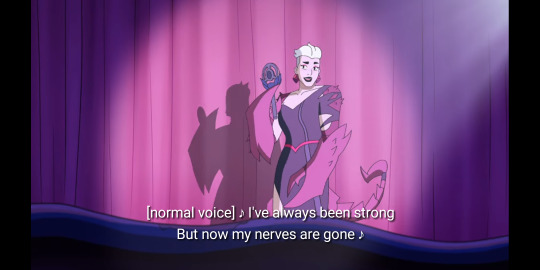
Prime was also a fascinating enemy. He's this sort of religious figure, this world destroyer who's been around for seemingly centuries, maybe much longer. He's cold, calm and calculated. I've seen it pointed out that he's everything Hordak is not. He's manipulative, knows body language and facial expressions, and has a perfect grasp on how to get exactly what we wants. My favorite aspect of this season was the hive mind control. This was a very interesting plotline to me, and I thoroughly enjoyed HiveMind!Catra as well as Wrong Hordak. I loved the idea of pitting allies against each other and the angst and emotional weight that carried.
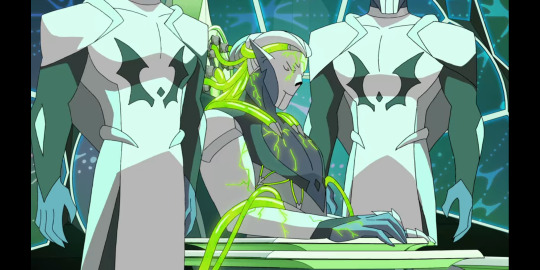
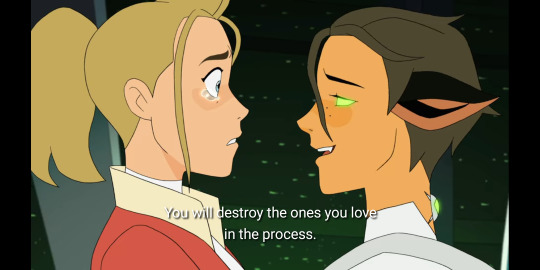
Going to use that point to segue into one of this season's strengths: Netossa and Spinnerella. Wow! We get a chance to see what a healthy queer/wlw relationship looks like, and two background characters get major upgrades in relevance. Two diversity points for one being a big girl and for the couple being interracial (in our world anyway), but diversity is the norm is SPOP and we might have to stan forever. It was extremely heartwarming and resulted in one of my favorite scenes to ever show up in animated media (one which I'll be stealing to add to my vows if I ever get married):
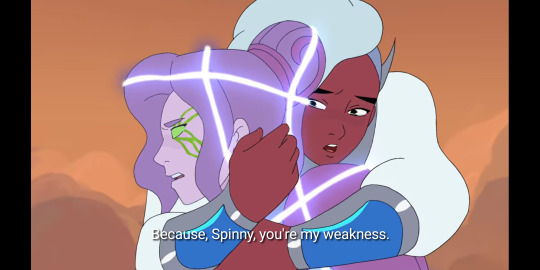
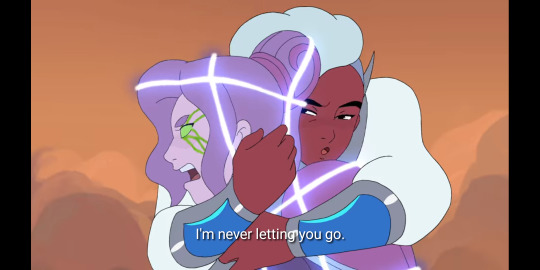
It was beautiful and I will absolutely never shut up about it.
There were some beautiful moments this season!! Absolutely gorgeous. A highlight for me cinematically was episode 5, which will probably bother some people when I say what I will below. I will be honest, the new transformation sequence and the scene of Adora holding Catra as She-Ra was powerful and had my heart pounding with excitement. It was awesome.
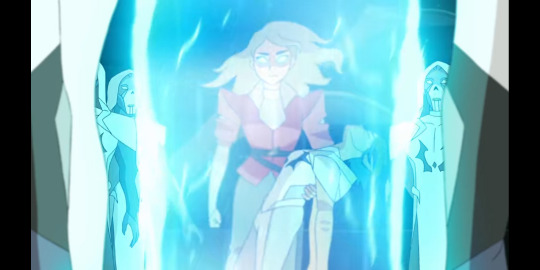
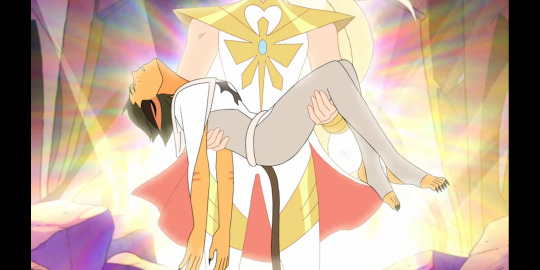
On the other hand...
What She-Ra s5 did WRONG
I'm going to break my issues with the final season down one by one, starting with the narrative of abuse.
From the very beginning, abuse is the most prevalent theme in the show. Prime (HP) abuses Hordak, Hordak abuses SW, SW abuses both Adora and Catra, and Catra abuses Adora. I liked the Crew-Ra tackling this issue. Abused people abuse people, right?
Why was everyone redeemed in s5? (Well, except for Prime, he was blasted away by She-Ra.) Hordak was given a blank slate to start over, even though he was the reason Etheria was war torn for at least a few decades; SW was given a hero's sacrifice, where at the end of her life she finally decides to do some good; and Catra is immediately forgiven for doing one good thing and all trust in placed in her simultaneously.
Hordak and H. Prime as abusers are pretty cut and dry; at no point are they ever remorseful for their actions, except for Hordak in the case of being abusive to Entrapta. SW is much more of an interesting character to analyze, because her motivations are geared directly towards herself. This seems to change in the final season, when she returns to her original motivations from back when she was in Mystacor. Defending her home. In her pursuit of the power needed to defend Etheria from the Horde, she fell into darkness. She began to abuse Adora and Catra.
One could argue that the hero's sacrifice she was given for redemption was unneeded. SW was an individual addicted to power. She was manipulative, using fake affection as a means to control. She didn't deserve a redemption. The only evidence we have of this supposed change of heart is a line to Castaspella: "...and stop me if I try to take the power for myself." Okay... so, SW, um... what changed your mind? Was it Micah? Because at no point has he forgiven you. In fact, there should've been much more hostility between the two of you (which is a point I'll address in a moment). In all honesty, the relationship between SW and Micah reminds me of what should've happened between Catra and Glimmer, or Catra and Scorpia.
And Catra... My problem with her story is that she was kinda just... forgiven? instantly. no repercussions, no long talks about feelings, no... consequences. Catra got the girl and that was it. A small list of things she did over 4 seasons, in no certain order:
Scratched what was implied were scarring marks down Adora's back
Was the cause of Angella's "death" #angelladeservedbetter
Kidnapped both Glimmer and Bow
Opened a world-ending portal all to ensure Adora failed
Also pushed Adora into what looked like an abyss
Verbally abused Scorpia into leaving
Wanted to pit Corrupted!She-Ra against her friends (dehumanization)
Got Entrapta sent to Beast Island, a deadly place no one ever returns from
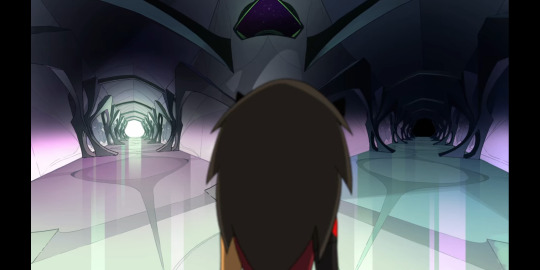
And this is just the stuff off the top of my head. We all knew Catra was going to get a redemption, but this one was completely undeserved. She apologized to Adora and Entrapta. Two very short apologies for what canonly was at minimum, months of abuse, manipulation, intent to kill (which is literally mentioned by Adora) and general disregard for anyone or anything but revenge for something that didn't even deserve it. The entire cast should've been outraged. Glimmer in particular had a very big reason not to ever forgive Catra ("I'm not losing another parent!"), but it was all glossed over.
The biggest issue with season 5 was the abuse plotline completely dropped. You can't spend 4 seasons explaining how the cycle of abuse affects you and everyone around you... and shelve it. And we know the reason why it was shelved.
Let me first preface this with the fact that I am super happy we got representation. As a queer nblw who grew up feeling alone, it's so good to see things changing in media. An onscreen wlw kiss on a kids' show is groundbreaking and I'm very happy that She-Ra broke this barrier.
But all representation is not good representation. Catra and Adora is not a good representation of a healthy relationship.
Catra is shown throughout the series to be very unstable. This is even prevalent in season 5, when Adora "chooses SW" over Catra, she runs away. This breaks Adora's heart. The last thing that Catra needs is a relationship when she hasn't even confronted the issues that she has. There's no healing done in season 5, no therapy as the fandom loved to meme about, no long talks about forgiveness and the hurt caused. There's no callback to any of the pain and anguish that Catra put Adora through. Catra may love Adora, but if there is no healing done for the both of them, their relationship will fail. They will fall into the same cycle again. Adora will do something Catra doesn't like, Catra will do what she's done for all of the show, and it will repeat until something breaks.
I'm going to talk about the implications of the ending we have now, and feel free to argue with me.
She-Ra is a kids' show. Abuse is one of the main themes. Catra is shown to be an abuser. Here's what we are teaching younger audiences:
a. if you love someone enough, maybe they'll change
b. everyone deserves a second chance
c. your abuser will change as long as you're loyal and never stop trying to love them
d. things someone does to hurt you mean nothing in the wake of forgiveness
e. if someone who hurt you changes suddenly and wants to be back in your life, you should let them back in
Character interactions for the things that mattered (plot threads from previous seasons, general personality clashes, etc) were absent this season, in the moments where they mattered the most. (The best three in my opinion were Scorpia and Perfuma, the BFS inviting Catra in, and Mermista and Entrapta.) Glimmer and Adora should've had their time to talk. Scorpia should've gotten to say her piece to Catra. SW and Micah should've interacted more. Micah and Glimmer should've gotten more than an introduction!
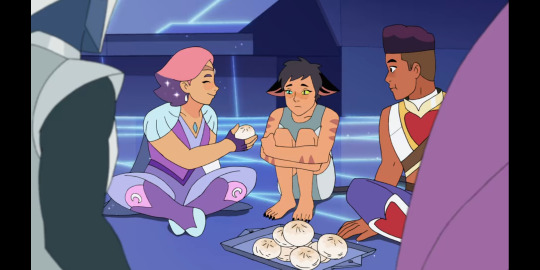
I'm not going to get into how the entire final season was wrapped around making Catra and Adora get together (a fundamental writing no-no; it never ends up working), or how it was bad writing. I just want everyone to think critically for one moment. There are so many other glaring issues in what was, overall, a stellar show. If there was another season, or some mini episodes where the characters talk out their problems and past transgressions against each other, then I could excuse She-Ra. But I doubt we're going to get any of that. So I won't.
#i am absolutely open to criticism and discussion!#literally just be respectful#that's all i ask#catradora#glimmadora#she ra#she ra s5#she ra hordak#she ra scorpia#she ra netflix#she ra adora#spop#spop entrapta#spop s5#spop catra#spop bow#spop spoilers#spop spinnerella#she ra and the princesses of power#entrapdak#glimbow#spinnetossa#scorptra#glitra#sorry im trying to tag all the she ra shit i can think of off the top of my head#welcome to the longest post i have eve and will ever make#she ra critical#spop critical
649 notes
·
View notes
Note
oooh i just noticed those tags abt the next arc being more morris-focused (+raz) that sounds cool!!! we need more morris content in the world (which i say about every junior agent but especially him)
i'm curious now (but feel free to ignore this bit if its spoilers) will each arc focus on a different junior agent/pov or will it be more focused on a few specific ones/the general intern group?
Hope you have a great day!!!
Morris never gets any love, it's honestly extremely sad. And not just because he's my favorite of the interns, he's just a really fun character with a fun gimmick that gets no development (why are you even in the Psychonauts if you just want to run a radio station all day, sir? Sir? Answer me sir.)
...I guess fun gimmick with no development is actually true of all the interns, but, y'know, mustn't dwell. That's what fanfic is, right? If the powers that be won't feed you, feed yourself.
As for the second part of the question, it might help if I go into my creative process a little: Generally when I start, I write down every single idea I have in the moment: This could be broad concepts, certain images, scenes that I want to have happen, vital plot points, themes and even some phrases that I'd like to have as runners through the story, and what characters I need to fill what narrative roles and if I need to make an OC for something that a canon character won't work for, and then I start putting them into a rough chronological order and that becomes the rough outline for the entire story. I don't really outline too strictly though, because a lot of the story comes out through the writing of it.
As my old writing teacher used to say: "Only writing is writing." I always took that to have two meanings: 1. outlining and planning and plotting have their place, but the only way to actually write is to do the mechanical action of putting words into sentences and 2. You have no idea what's going to come out as you actually start to put things into concrete words. As a fer'instance I never actually planned to have Linda involved in the first arc, until I realized that she could probably rumble the psitanium thieves just by sticking her head out of the lake, and that changed the tone of the fic considerably in a way that I think is better (Linda's just so friendly she softens things considerably.)
So basically my answer is...I sure wanted each intern to have their own story, but I'm not sure that's in the cards. The fanfic has a plot, but it's not directly told, exactly? Pieces of it will come out as the characters just do things in episodic chunks, which gives me some freedom and is restricting in others; It lets me go explore fun tangents but also risks meandering. I think Norma's character arc may just end up threaded through the entire thing rather than having her own chapter because she has a unique role in the group? And I was never confident in the idea I had for a Lizzie-centric story, and eventually I just had to kill that darling when I realized I wasn't enthusiastic about it, and right now I don't have anything to replace it with. Even this upcoming Morris arc was supposed to be two stories that ended up being too similar, so I merged them into one. And I never came up with anything for Sam.
But then I may end up changing my plans entirely depending on how things develop. It's also part of the funny nature of fanfic that the audience gets to watch it written in real time, so if you notice something that looks like me changing gears in the middle of something...that's probably what happened. I'm not perfect as a writer and this format lends itself to some challenges, but I think I've got enough pieces to make this fic fun anyway.
#True Psychic Tales: The Next Generation#I don't know if you've noticed#But I'm a wordy bitch#Another example: I had the idea for the Dreaming Well spring forth from my head fully formed#But then there was that Dad's Shame dialogue and suddenly I had to rework the plot to account for it#Thaaaaaaat's creativity
7 notes
·
View notes
Text
FFXIV | ENDWALKER
A few more things about Endwalker - no spoilers but I’ll put it under a cut just in case - as I sit here at my work desk being a real person when honestly I’m nowhere ready to be at all real because it feels like I’m just trapped somewhere, flat on my back and trying to haul in some oxygen.
Things I Loved:
The zones. Oh my god, the zones. The visual details in each were just outstanding just *chef’s kiss*. They were all so amazing beautiful, even the one zone that was intended to be harsh and fierce and pitiless. They all just tore your heart out. Well, except Zone 2. That was just *pretty*.
The fact that I did not see anything coming, for the most part. Things that I expected as a matter of course just... did not happen. Characters that I thought would be central or at least prominent were not, with certain exceptions. Almost everything just took a hard left narratively when I thought for sure we were going highway speeds straight forward and I ended up with the most amazing whiplash.
Zones 5 and 6 hit me so hard.
The MUSIC. Which we all knew was coming but the ambient stuff was sooo good and then the re-mixes of the theme songs were so cleverly inserted at various moments. As always, have tissues ready for every time Answers plays.
The micro-stories. Some of the new characters might not have had a ton of screentime in the grand scheme of things, but had very large impact as various things resolved for them. A frightened boy running through a jungle and I’m sitting here feelin this upwelling of emotion just remembering it.
The fact that the lyrics to Answers absolutely gives you Endwalker. We just didn’t know enough to know it at the time. Like, seriously.
The dedication and love poured into all the corners, overflowing and boundless.
The sheer scope of it. Endwalker is HUGE. It’s so ballsy in its concept and execution, connecting so many pieces, giving you the links that finally make sense of those unanswered questions. Why this, why that? Because this, because that. That the development team and the story writers managed to thread multiple needles to make everything line up the way it did, some of it going all the way back to clues given in ARR -- and considering the gamification of games rampant in the industry where nothing makes sense and everything is retconned constantly to make way for whatever is hot in the gaming world at the moment, it was such a fucking relief to realize that this was, in fact, immaculately scripted right from the get go.
Further to the above, that while Shadowbringers focused more on the inter-personal, Endwalker focused more on the bigger picture (much like Stormblood did). Both had relatively broad playing fields but ShB spotlighted tighter and harder whereas Endwalker just flood-lamped the whole battlefield. While I did miss the smaller focus for awhile, it just ended up being this overwhelming sweeping culmination that seemed so beautifully inevitable. I am in awe.
The fanservice. That the dev team did not “talk down” to the players with gratuitous anything in regards to our favorite and not-so-favorite people. We were given good, solid, emotional moments with everyone during the entire story and none of felt slapped on or schlocky or pandering. Even better, your friends had emotional moments between themselves and other characters important to them that had nothing to do with you at all. Little things, human things, wonderful things.
Things I Did Not Love:
Zone 4. Of all of it, this was the part I enjoyed least although I still had a good time. There felt like excessive running back and forth during the second half of it and the layout meant having to loop around obstructions for further trip time. This was the one and only area where it felt like I was wheel spinning through sections for no particularly compelling reason.
That... feels like it? I mean, I have some personal peeves around a few things but none of it was so distracting that it’s worth mentioning here.
Things That I’m Looking Forward To:
The dangling threads. Characters that moved out of the story and did not return, leaving them in narrative limbo. Some of their exit lines seem very much to be foreshadowing, or at least teasers for future shenanigans around their plot point(s) that, while resolved, don’t necessarily mean finished. The things that I thought for sure we were going to be dealing with after Shadowbringers that we just didn’t even touch on.
The upcoming raid centered around Lahabrea in some way.
Whatever the fuck Elidibus was talking about at the end of the credits.
The fact that maybe now I can get my groceries shopped for on time instead of being glued to my monitor for hours and hours upon end.
5 notes
·
View notes
Text
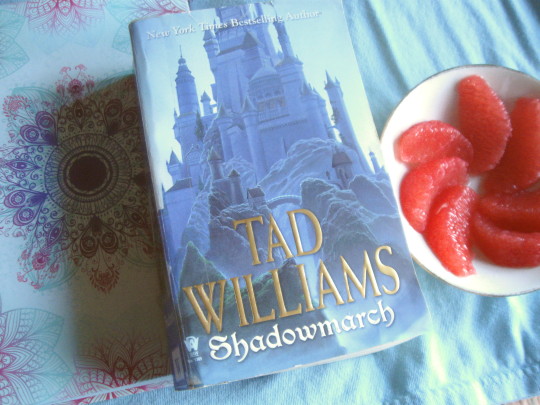
Books I Read in 2021
#83 - Shadowmarch, by Tad Williams
Mount TBR: 69/100
Beat the Backlist Bingo: Cover features your favorite color prominently
Rating: 1/5 stars
Well, that was a slog.
So I have a history with this piece of intellectual property. I was introduced to Williams as an author in college (1998) because several of the friends I made my first year were big fantasy nerds--no surprise there--and I was perfectly ready to move on from my high-school-era love of less sophisticated fantasy authors. I borrowed The Dragonbone Chair from one of those friends and off I went.
So in 2001 when news about Williams writing an online serial went around, and I saw the $15 price tag...well, I was a perpetually almost-broke college student still, and sure I spent money on books, but that was a high gateway, because a) I didn't own my own computer yet, I was borrowing friends' or using the computer lab to write papers and such; and b) sure, a chunky fantasy novel might be $7 or $8 in paperback, but it was portable, easy to reread whenever, and nobody had tablets or smartphones or e-readers yet, so an online serial publication was definitely not portable. Even fifteen dollars seemed like too much for the inconvenience of a book I could only read sitting at a computer, and couldn't read all of at once.
I was genuinely angry about this shift away from the paradigm, and much like Williams vowing this serial was online only and would never be published traditionally (which I distinctly remember but don't actually have a source for) I too vowed that I would never read it.
I held out much longer than he did, if my memory of that claim is even true. But I'm wishing now that I hadn't bothered.
This is bad. Not even close to the level of quality I expect from Williams, based on the earlier Memory, Sorrow, and Thorn series, as well as War of the Flowers--which was weird but I enjoyed it--and the Otherland series, which was even weirder and not always good, but yeah, I still enjoyed that too, for the most part.
Who am I supposed to care about in this book? I'm no stranger to multiple protagonists, but there are simply too many here, meaning none of them get the development time they would need to be interesting. I'm trying to wean myself from the complaint that protagonists need to be "likable," because a character can be a jerk and still be interesting, but few of these protagonists are particularly likable either!
1. Barrick is a whiny jerk who folds under pressure and abdicates responsibility to his sister, and then makes a spectacularly bad decision for no reason other than to set up some tension at the end, and his future arc. If it's because he's "mad," bad plot reason, and if it's because he's affected by the more general shadow-madness, well, I guess he could be vulnerable to it like anyone else, but that's pretty flimsy too.
2. Briony is a fairly standard "if only I weren't a woman, people would take me seriously" princess who doesn't fold as much under pressure but is dealt a really raw deal. I'll give her credit, she does legitimately try her best to rule her lands, but she's also kind of a whiny jerk like her brother, too.
3. Quinnitan is...pointless. Sure, I see how the end of her arc in this book echoes those of the Eddon twins, but there is no direct connection between her plot and anyone else's. And I mean that literally, if there's anything that ties her story to any other single part of the book, I simply do not see it, it's buried in lore or foreshadowing that was lost on me amid the sheer weight of nearly 800 pages of plodding narrative. I read all of her scenes constantly wondering why I should care, and the fact that her arc is a very basic harem plot, "I don't want to be a token wife but really what choice do I have?" sort of thing, doesn't help, because on its own it's incredibly unoriginal.
4. Chert is marginally likable, because he's arguably got the most defined personality and most personal growth in the book, as a person of a "little" race who is distinctly not human--I get a mix of gnome and dwarf, with a faint whiff of Podling from The Dark Crystal--and who deals with an unexpected foundling by taking him into his family and trying to make it work, even when that foundling is really a big blank space in the story who still manages to get into trouble.
5. Captain Vansen gets points from me for being the guardsman deep in unrequited love, which is a trope I would absolutely eat up with a spoon. The problem is, the object of that love is a protagonist I don't care for (Briony,) leading me to question what the eff he's thinking that he can even admire her from a distance, let alone be in infatuation/love. And his plot arc is mostly "something goes wrong that's not really has fault but everyone blames him anyway." Which got dull.
Chert and Vansen are most of the reason this book gets a second star*, honestly. Chert's scenes with the Rooftoppers are generally pretty excellent, even if they're mostly tied to a plot arc that I don't care for.
The other thing that's getting me about this is that it feels like a deliberately grim-dark retread of Memory, Sorrow, and Thorn. You've got a castle that's the seat of current government but used to belong to the enemy--the enemy that no one is sure even exists anymore, that lives in a land far enough away to feel distant but also somehow close enough to be threatening, once people believe in them again. That castle is perched upon magically important ruins/caverns, and that enemy has forms of magic/communication that affect humans and can cause or appear symptomatic of madness. There's a race of small likable people who aren't quite dwarves or any other "standard" fantasy race, but are still somehow cute/appealing. There's a crippled prince who's not really well-liked. One of the primary female protagonists is a young woman who laments the limitations of her womanhood under the patriarchal feudal system of the world.
And to someone who's never read either of these series, that list of similarities could mostly read like fairly common fantasy tropes, and I forgive anyone who reads this review and thinks that. But I've read MSaT probably ten times all the way through in the twenty-plus years since I was introduced to it, and I feel like I've just been handed the same story again, with a thick coat of gray paint slathered on it and a few details changed--and those changes are basically always for the worse. No one in this story can be said to be a direct equivalent to Simon, who gets a very clear hero's journey, but if I'm supposed to slot Barrick in as a Simon/Josua mashup (that crippled prince problem) then it takes the entire book to get Barrick out of his comfort zone and on his journey, where Simon got booted from the castle at the end of the first act of the first book.
And that gets at the underlying problem that is at least partially fueling all other problems--this book is clearly just the first act of the larger story, and yes i know! that is what first books do! but this also doesn't have a lot of forward motion on its own, and it doesn't resolve anything aside from the mystery of a single murder at that happens near the beginning. Seriously, all other plot threads get kicked down the road with the "and now they're exiles" theme that the ending has assigned to most of the protagonists. Chert doesn't suffer that fate, but the ending of his story line--also the end of the book itself--is the foundling reasserting that he doesn't know who he is, which is not new information. We've literally not known who he is the whole time, except that we do find out who his mother is, but don't find out how he was taken or why he apparently hasn't aged as much as he should have or what the Qar intended by sending him back "home." The identity of his mother is basically the least important question surrounding him.
I truly feel like I just read a 750-page prologue, and that is not a good feeling.
*Yeah, I told myself this was a two-star book, but by the time I wrote the whole review, it's not and I can't pretend I still believe that. This is a one-star book. This is so bad I don't want to go on with the series, even though it almost has to get better, now that most of our protagonists are out on their journeys. And because it could hardly get worse, right? But this already took up so much of my time (I had to take a week-long break in the middle to binge some romances, as a relief from all this grimdark toil) and even though I've managed to collect secondhand copies of the rest of the series, and they've been sitting on my shelves for a few years waiting for me to invest my energy into them...I'm giving up. Not worth it.
#booklr#book review#tad williams#shadowmarch#book photography#my photos#my reading challenges#mount tbr 2021#beat the backlist 2021
3 notes
·
View notes
Photo

Best of Sundance 2021.
From pandemic-era stories, via portraits of grief, to the serendipitous 1969 trilogy, the Letterboxd crew recaps our favorite films from the first major festival of the year.
Sundance heralds a new season of storytelling, with insights into what’s concerning filmmakers at present, and what artistic innovations may be on the horizon. As with every film festival, there were spooky coincidences and intersecting themes, whether it was a proliferation of pandemic-era stories, or extraordinary portraits of women working through grief (Land, Hive, The World to Come), or the incredible serendipity of the festival’s ‘1969 trilogy’, covering pivotal moments in Black American history: Summer of Soul (...Or When the Revolution Could Not Be Televised), Judas and the Black Messiah and the joyful Street Gang: How We Got to Sesame Street.
The hybrid model of this year’s Sundance meant more film lovers across the United States—a record number of you, in fact—‘attended’ the prestigious indie showcase. Our Festiville team (Gemma Gracewood, Aaron Yap, Ella Kemp, Selome Hailu, Jack Moulton and Dominic Corry) scanned your Letterboxd reviews and compared them with our notes to arrive at these seventeen feature-length documentary and narrative picks from Sundance 2021. There are plenty more we enjoyed, but these are the films we can’t stop thinking about.
Documentary features
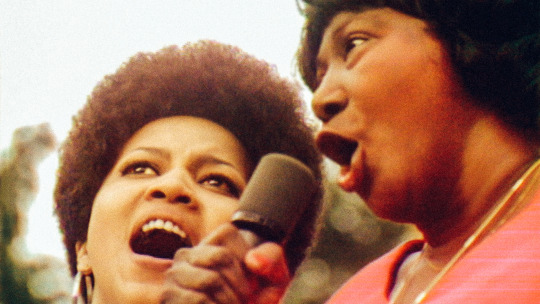
Summer of Soul (...Or, When the Revolution Could Not Be Televised)
Directed by Ahmir-Khalib Thompson (AKA Questlove)
One hot summer five decades ago, there was a free concert series at a park in Harlem. It was huge, and it was lovely, and then it was forgotten. The Harlem Cultural Festival of 1969 brought together some of the world’s most beloved Black artists to connect with Black audiences. The star power and the size of the crowds alone should have been enough to immortalize the event à la Woodstock—which happened the same summer, the film emphasizes. But no one cared to buy up the footage until Ahmir-Khalib Thompson, better known as Questlove, came along.
It would have been easy to oversimplify such a rich archive by stringing together the performances, seeking out some talking heads, and calling it a day. But Questlove was both careful and ebullient in his approach. “Summer of Soul is a monumental concert documentary and a fantastic piece of reclaimed archived footage. There is perhaps no one better suited to curate this essential footage than Questlove, whose expertise and passion for the music shines through,” writes Matthew on Letterboxd. The film is inventive with its use of present interviews, bringing in both artists and attendees not just to speak on their experiences, but to react to and relive the footage. The director reaches past the festival itself, providing thorough social context that takes in the moon landing, the assassinations of Black political figures, and more. By overlapping different styles of documentary filmmaking, Questlove’s directorial debut embraces the breadth and simultaneity of Black resilience and joy. A deserving winner of both the Grand Jury and Audience awards (and many of our unofficial Letterboxd awards). —SH
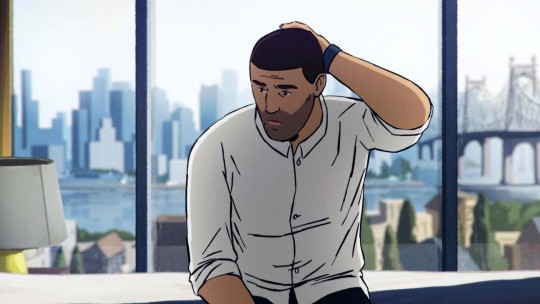
Flee
Directed by Jonas Poher Rasmussen
Flee is the type of discovery Sundance is designed for. Danish documentarian Jonas Poher Rasmussen tells the poignant story of his close friend and former classmate (using the pseudonym ‘Amin Nawabi’) and his daring escape from persecution in 1990s Afghanistan. Rasmussen always approaches tender topics with sensitivity and takes further steps to protect his friend’s identity by illustrating the film almost entirely in immersive animation, following in the footsteps of Waltz With Bashir and Tower. It’s a film aware of its subjectivity, allowing the animated scenes to alternate between the playful joy of nostalgia and the mournful pain of an unforgettable memory. However, these are intercepted by dramatic archive footage that oppressively brings the reality home.
“Remarkably singular, yet that is what makes it so universal,” writes Paul. “So many ugly truths about the immigration experience—the impossible choices forced upon people, and the inability to really be able to explain all of it to people in your new life… You can hear the longing in his voice, the fear in his whisper. Some don’t get the easy path.” Winner of the World Cinema (Documentary) Grand Jury Prize and quickly acquired by Neon, Flee is guaranteed to be a film you’ll hear a lot about for the rest of 2021. —JM

Taming the Garden
Directed by Salomé Jashi
There’s always a moment at a film festival when fatigue sets in, when the empathy machine overwhelms, and when I hit that moment in 2021, I took the advice of filmmaker and Sundance veteran Jim Cummings, who told us: “If you’re ever stressed or tired, watch a documentary to reset yourself.” Taming the Garden wasn’t initially on my hit-list, but it’s one of those moments when the ‘close your eyes and point at a random title’ trick paid off. Documentary director Salomé Jashi does the Lorax’s work, documenting the impact and grief caused by billionaire former Georgian PM Bidzina Ivanishvili’s obsession with collecting ancient trees for his private arboretum.
“A movie that is strangely both infuriating and relaxing” writes Todd, of the long, locked-off wide shots showing the intense process of removing large, old trees from their village homes. There’s no narration, instead Jashi eavesdrops on locals as they gossip about Ivanishvili, argue about whether the money is worth it, and a feisty, irritated 90-year-old warns of the impending environmental fallout. “What you get out of it is absolutely proportional to what you put into it,” writes David, who recommends this film get the IMAX treatment. It’s arboriculture as ASMR, the timeline cleanse my Sundance needed. The extraordinary images of treasured trees being barged across the sea will become iconic. —GG

The Most Beautiful Boy in the World
Directed by Kristian Petri and Kristina Lindström
Where Taming the Garden succeeds through pure observation, The Most Beautiful Boy in the World relies on the complete participation of its title subject, actor Björn Andrésen, who was thrust into the spotlight as a teenager. Cast by Italian director Lucino Visconti in Death in Venice, a 1971 adaptation of Thomas Mann’s novella about obsession and fatal longing, Andrésen spent the 1970s as an object of lust, with a side-gig as a blonde pop star in Japan, inspiring many manga artists along the way.
As we know by now (Alex Winter’s Showbiz Kids is a handy companion to this film), young stardom comes at a price, one that Andrésen was not well-placed to pay even before his fateful audition for Visconti. But he’s still alive, still acting (he’s Dan in Midsommar), and ready to face the mysteries of his past. Like Benjamin Ree’s excellent The Painter and the Thief from last year, this documentary is a constantly unfolding detective story, notable for great archive footage, and a deep kindness towards its reticent yet wide-open subject. —GG

All Light, Everywhere
Directed by Theo Anthony
Threading the blind spots between Étienne-Jules Marey’s 19th-century “photographic rifle”, camera-carrying war pigeons and Axon’s body-cam tech, Theo Anthony’s inquisitive, mind-expanding doc about the false promise of the all-seeing eye is absorbing, scary, urgent. It’s the greatest Minority Report origin story you didn’t know you needed.
Augmented by Dan Deacon’s electronic soundscapes and Keaver Brenai’s lullingly robotic narration, All Light, Everywhere proves to be a captivating, intricately balanced experience that Harris describes as “one part Adam Curtis-esque cine-essay”, “one part structural experiment in the vein of Koyaanisqatsi” and “one part accidental character study of two of the most familiar yet strikingly unique evil, conservative capitalists…”. Yes, there’s a tremendous amount to download, but Anthony’s expert weaving, as AC writes, “make its numerous subjects burst with clarity and profundity.” For curious cinephiles, the oldest movie on Letterboxd, Jules Jenssen’s Passage de Vénus (1874), makes a cameo. —AY
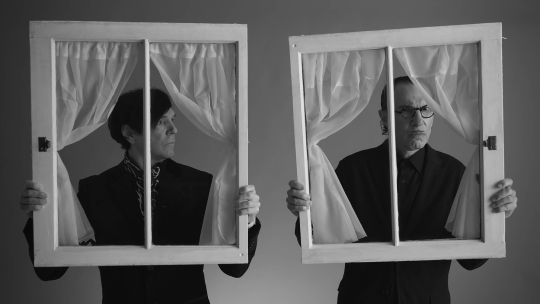
The Sparks Brothers
Directed by Edgar Wright
Conceived at a Sparks gig in 2017 upon the encouragement of fellow writer-director Phil Lord, Edgar Wright broke his streak of riotous comedies with his first (of many, we hope) rockumentary. While somewhat overstuffed—this is, after all, his longest film by nearly fifteen minutes—The Sparks Brothers speaks only to Wright’s unrestrained passion for his art-pop Gods, exploring all the nooks and crannies of Sparks’ sprawling career, with unprecedented access to brothers and bandmates Ron and Russell Mael.
Nobody else can quite pin them down, so Wright dedicates his time to put every pin in them while he can, building a mythology and breaking it down, while coloring the film with irresistible dives into film history, whimsically animated anecdotes and cheeky captions. “Sparks rules. Edgar Wright rules. There’s no way this wasn’t going to rule”, proclaims Nick, “every Sparks song is its own world, with characters, rules, jokes and layers of narrative irony. What a lovely ode to a creative partnership that was founded on sticking to one’s artistic guns, no matter what may have been fashionable at the time.” —JM
Narrative features
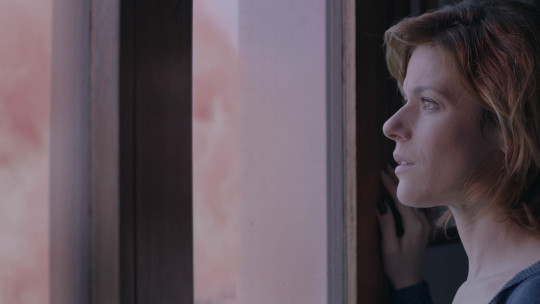
The Pink Cloud
Written and directed by Iuli Gerbase
The Pink Cloud is disorienting and full of déjà vu. Brazilian writer-director Iuli Gerbase constructs characters that are damned to have to settle when it comes to human connection. Giovana and Yago’s pleasant one-night stand lasts longer than expected when the titular pink cloud emerges from the sky, full of a mysterious and deadly gas that forces everyone to stay locked where they stand. Sound familiar? Reserve your groans—The Pink Cloud wasn’t churned out to figure out “what it all means” before the pandemic is even over. Gerbase wrote and shot the film prior to the discovery of Covid-19.
It’s “striking in its ability to prophesize a pandemic and a feeling unknown at the time of its conception. What was once science fiction hits so close now,” writes Sam. As uncanny as the quarantine narrative feels, what’s truly harrowing is how well the film predicts and understands interiorities that the pandemic later exacerbated. Above all, Giovana is a woman with unmet needs. She is a good partner, good mother and good person even when she doesn’t want to be. Even those who love her cannot see how their expectations strip her of her personhood, and the film dares to ask what escape there might be when love itself leaves you lonely. —SH
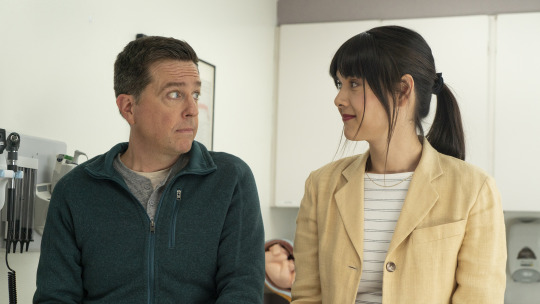
Together Together
Written and directed by Nikole Beckwith
Every festival needs at least one indie relationship dramedy, and Together Together filled that role at Sundance 2021 with a healthy degree of subversion. It follows rom-com structure while ostensibly avoiding romance, instead focusing on how cultivating adult friendships can be just hard, if not harder.
Writer-director Nikole Beckwith warmly examines the limits of the platonic, and Patti Harrison and Ed Helms are brilliantly cast as the not-couple: a single soon-to-be father and the surrogate carrying his child. They poke at each other’s boundaries with a subtle desperation to know what makes a friendship appropriate or real. As Jacob writes: “It’s cute and serious, charming without being quirky. It’s a movie that deals with the struggle of being alone in this world, but offers a shimmer of hope that even if you don’t fall in fantastical, romantic, Hollywood love… there are people out there for you.” —SH
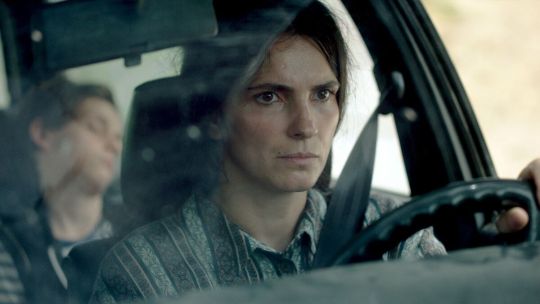
Hive
Written and directed by Blerta Basholli
Hive, for some, may fall into the “nothing much happens” slice-of-life genre, but Blerta Basholli’s directorial debut holds an ocean of pain in its small tale, asking us to consider the heavy lifting that women must always do in the aftermath of war. As Liz writes, “Hive is not just a story about grief and trauma in a patriarchy-dominated culture, but of perseverance and the bonds created by the survivors who must begin to consider the future without their husbands.”
Yllka Gashi is an understated hero as Fahrjie, a mother-of-two who sets about organizing work for the women of her village, while awaiting news of her missing husband—one of thousands unaccounted for, years after the Kosovo War has ended. The townsmen have many opinions about how women should and shouldn’t mourn, work, socialize, parent, drive cars and, basically, get on with living, but Fahrjie persists, and Basholli sticks close with an unfussy, tender eye. “It felt like I was a fly on the wall, witnessing something that was actually happening,” writes Arthur. Just as in Robin Wright’s Land and Mona Fastvold’s The World to Come, Hive pays off in the rare, beaming smile of its protagonist. —GG
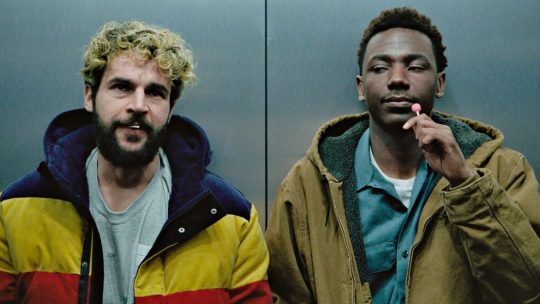
On the Count of Three
Directed by Jerrod Carmichael, written by Ari Katcher and Ryan Welch
It starts with an image: two best friends pointing guns at each other’s heads. There’s no anger, there’s no hatred—this is an act of merciful brotherly love. How do you have a bleak, gun-totin’ buddy-comedy in 2021 and be critically embraced without contradicting your gun-control retweets or appearing as though your film is the dying embers of Tarantino-tinged student films?
Comedian Jerrod Carmichael’s acerbic directorial debut On the Count of Three achieves this by calling it out every step of the way. Guns are a tool to give insecure men the illusion of power. They are indeed a tool too terrifying to trust in the hands of untrained citizens. Carmichael also stars, alongside Christopher Abbott, who has never been more hilarious or more tragic, bringing pathos to a cathartic rendition of Papa Roach’s ‘Last Resort’. Above all, Carmichael and Abbott’s shared struggle and bond communicates the millennial malaise: how can you save others if you can’t save yourself? “Here’s what it boils down to: life is fucking hard”, Laura sums up, “and sometimes the most we can hope for is to have a best friend who loves you [and] to be a best friend who loves. It doesn’t make life any easier, but it sure helps.” Sundance 2021 is one for the books when it comes to documentaries, but On the Count of Three stands out in the fiction lineup this year. —JM
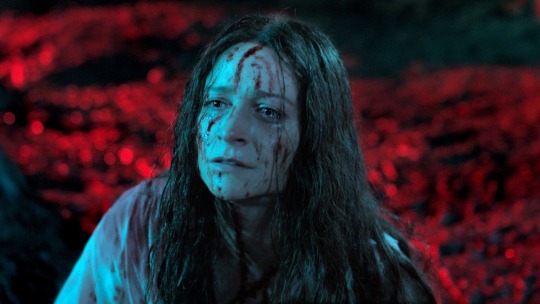
Censor
Directed by Prano Bailey-Bond, written by Bailey-Bond and Anthony Fletcher
The first of several upcoming films inspired by the ‘video nasty’ moral panic over gory horror in mid-’80s Britain, Prano Bailey-Bond leans heavily into both the period and the genre in telling the story of a film censor (a phenomenal Niamh Algar—vulnerable and steely at the same time) who begins to suspect a banned movie may hold the key to her sister’s childhood disappearance. Often dreamlike, occasionally phantasmagorical and repeatedly traumatic, even if the worst gore presented (as seen in the impressively authentic fictional horrors being appraised) appears via a screen, providing a welcome degree of separation.
Nevertheless, Censor is definitely not for the faint of heart, but old-school horror aficionados will squeal with delight at the aesthetic commitment. “I’m so ecstatic that horror is in the hands of immensely talented women going absolutely batshit in front of and behind the camera.” writes Erik. (Same here!) “A great ode to the video-nasty era and paying tribute to the great horror auteurs of the ’80s such as Argento, De Palma and Cronenberg while also doing something new with the genre. Loved this!” writes John, effectively encapsulating Censor’s unfettered film-nerd appeal. —DC
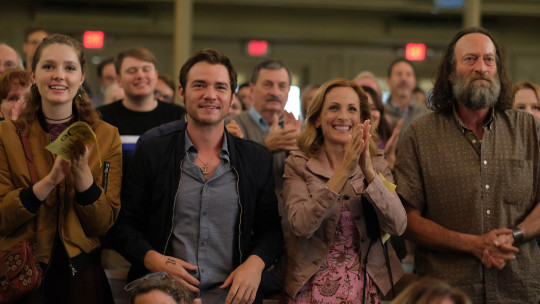
CODA
Written and directed by Siân Heder
A film so earnest it shouldn’t work, with a heart so big it should surely not fit the size of the screen, CODA broke records (the first US dramatic film in Sundance history to win all three top prizes; the 25-million-dollar sale to Apple Studios), and won the world over like no other film. “A unique take on something we’ve seen so much,” writes Amanda, nailing the special appeal of Siân Heder’s coming-of-ager and family portrait. Emilia Jones plays Ruby, the only hearing person in her deaf family, at war between the family business and her passion for singing. While Heder is technically remaking the French film La Famille Bélier, the decision to cast brilliant deaf actors—Troy Kotsur, Marlee Matlin and Daniel Durant—makes this feel brand new.
But it’s not just about representation for the sake of it. A sense of authenticity, in humor as much as affection, shines through. With a script that’s 40 per cent ASL, so many of the jokes are visual gags, poking fun at Tinder and rap music, but a lot of the film’s most poignant moments are silent as well. And in Ruby’s own world, too, choir kids will feel seen. “I approve of this very specific alto representation and the brilliant casting of the entire choir,” Laura confirms in her review. Come for the fearless, empathetic family portrait, stay for the High School Musical vibes that actually ring true. —EK
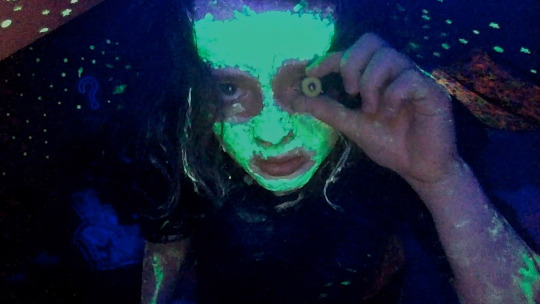
We’re All Going to the World’s Fair
Written and directed by Jane Schoenbrun
Perhaps the most singular addition to the recent flurry of Extremely Online cinema—Searching, Spree, Host, et al—Jane Schoenbrun’s feature debut ushers the viewer into a haunted, hypno-drone miasma of delirium-inducing YouTube time-suck, tenebrous creepypasta lore and painfully intimate webcam confessionals. Featuring an extraordinarily unaffected, fearless performance by newcomer Anna Cobb, the film “unpacks the mythology of adolescence in a way that’s so harrowingly familiar and also so otherworldly”, writes Kristen. Not since Kiyoshi Kurosawa’s Pulse has there been such an eerily lonely, and at times strangely beautiful, evocation of the liminal spaces between virtual and real worlds.
For members of the trans community, it’s also a work that translates that experience to screen with uncommon authenticity. “What Schoenbrun has accomplished with the form of We’re All Going to the World’s Fair is akin to catching a wisp of smoke,” writes Willow, “because the images, mood and aesthetic that they have brought to life is one that is understood completely by trans people as one of familiarity, without also plunging into the obvious melodrama, or liberal back-patting that is usually associated with ‘good’ direct representation.” One of the most original, compelling new voices to emerge from Sundance this year. —AY
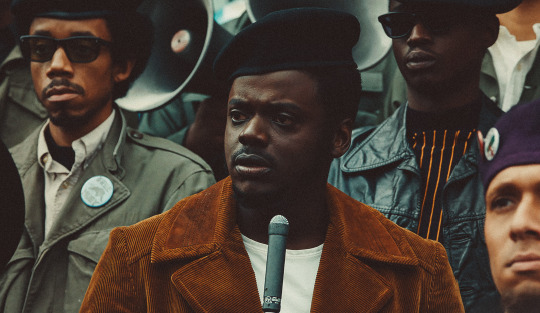
Judas and the Black Messiah
Directed by Shaka King, written by King, Will Berson, Kenneth Lucas and Keith Lucas
It was always going to take a visionary, uncompromising filmmaker to bring the story of Fred Hampton, the deputy chairman of the national Black Panther Party, to life. Shaka King casts Daniel Kaluuya as Hampton, and LaKeith Stanfield as William “Wild Bill” O’Neal, the FBI informant whose betrayal leads to Hampton’s assassination. Both actors have never been better, particularly Kaluuya who Fran Hoepfner calls “entrancing, magnetic, fizzling, romantic, riveting, endlessly watchable.”
Judas and the Black Messiah is an electric, involving watch: not just replaying history by following a certain biopic template. Instead, it’s a film with something to say—on power, on fear, on war and on freedom. “Shaka King’s name better reverberate through the halls of every studio after this,” writes Demi. A talent like this, capable of framing such a revolution, doesn’t come around so often. We’d better listen up. —EK

Pleasure
Directed by Ninja Thyberg, written by Thyberg and Peter Modestij
A24’s first purchase of 2021. Ironically titled on multiple levels, Pleasure is a brutal film that you endure more than enjoy. But one thing you can’t do is forget it. Ninja Thyberg’s debut feature follows a young Swedish woman (Sofia Kappel) who arrives in Los Angeles with dreams of porn stardom under the name ‘Bella Cherry’. Although Bella is clear-eyed about the business she’s getting into, Thyberg doesn’t shy away from any of the awfulness she faces in order to succeed in an industry rife with exploitation and abuse. Bella does make allies, and the film isn’t suggesting that porn is only stocked with villains, but the ultimate cost is clear, even if it ends on an ever-so-slightly ambiguous note.
Touching as it does on ambition, friendship and betrayal in the sex business, Pleasure is often oddly reminiscent of Paul Verhoeven’s Showgirls. Or rather, the gritty film Showgirls was claiming to be, as opposed to the camp classic it became. There’s nothing campy here. Kappel is raw and fearless in the lead, but never lets the viewer lose touch with her humanity. Emma puts it well: “Kappel gives the hardest, most provocative and transfixing performance I’ve seen all festival.” “My whole body was physically tense during this,” writes Gillian, while Keegan perhaps speaks for most when she says “Great film, never want to see it again.” —DC
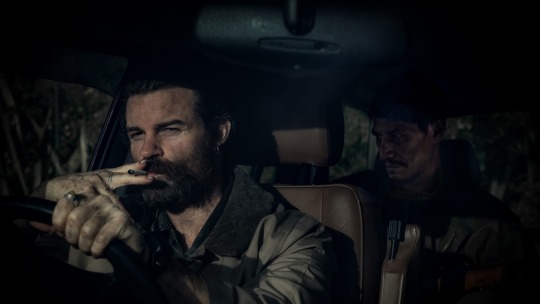
Coming Home in the Dark
Directed by James Ashcroft, written by Ashcroft and Eli Kent
A family camping trip amidst some typically stunnin—and casually foreboding— New Zealand scenery is upended by a shocking rug-pull of violence that gives way to sustained terror represented by Daniel Gillies’ disturbingly calm psychopath. The set-up of this thriller initially suggests a spin on the backwoods brutality thriller, but as Coming Home in the Dark progresses and hope dissipates, the motivations reveal themselves to be much more personal in nature, and informed on a thematic level by New Zealand’s colonial crimes against its Indigenous population. It’s a stark and haunting film that remains disorientating and unpredictable throughout, repeatedly daring the viewer to anticipate what will happen next, only to casually stomp on each glimmer of a positive outcome.
It’s so captivatingly bleak that a viewing of it, as Collins Ezeanyim’s eloquent reaction points out, does not lend itself to completing domestic tasks. The film marks an auspicious debut for director and co-writer James Ashcroft. Jacob writes that he “will probably follow James Ashcroft’s career to the gates of Hell after this one”. Justin hits the nail on the head with his description: “Lean and exceptionally brutal road/revenge film … that trades in genre tropes, especially those of Ozploitation and ’70s Italian exploitation, but contextualizes them in the dark history of its country of origin.” —DC
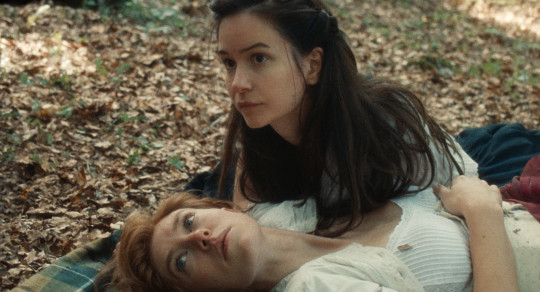
The World to Come
Directed by Mona Fastvold, written by Ron Hansen and Jim Shepard
Mona Fastvold has not made the first, nor probably the last, period romance about forbidden lesbian love. But The World to Come focuses on a specific pocket in time, a world contained in Jim Shepard’s short story ‘Love & Hydrogen’ from within the collection giving the film its name. Katherine Waterston and Vanessa Kirby are Abigail and Tallie, farming neighbors, stifled by their husbands, who find brief moments of solace, of astonishment and joy, together. What shines here is the script, a verbose, delicate narration that emanates beauty more than pretence. “So beautifully restrained and yet I felt everything,” Iana writes.
And you can feel the fluidity and elegance in the way the film sounds, too: composer Daniel Blumberg’s clarinet theme converses with the dialogue and tells you when your heart can break, when you must pause, when the end is near. “So much heartache. So much hunger. So much longing. Waves of love and grief and love and grief,” writes Claira, capturing the ebb and flow of emotion that keeps The World to Come in your mind long after the screen has gone silent. —EK
Related content
The 2021 Sundance Film Festival lineup by Letterboxd rating
Letterboxd’s ‘Official’ Top 50 of 2021
Awards Season 2020-2021: our awards-tracker list
Letterboxd’s Festiville HQ: our home for up-to-the-minute festival coverage
#sundance#sundance film festival#sundance 2021#sundance2021#questlove#summer of soul#black woodstock#shaka king#judas and the black messiah#letterboxd top 50#best of sundance 2021#letterboxd
11 notes
·
View notes
Text
without fail tag
THE “WITHOUT FAIL” TAG — List five things that you, WITHOUT FAIL, weave into or explore in your stories, whether it be specific themes or tropes, character archetypes, allusions to other literary works, what have you! It really can be anything that you consistently include in your narratives for whatever reason. Then invite others to share theirs by tagging them!
I was tagged by @deadlymodern - thank you so much for tagging me, this tag is amazing and I loved reading your answers! I can tell you have a very thorough approach to your writing & themes, it’s so cool!
(tagging people at the bottom of the post if you want to skip)

1. flowers, skies & words
grouping them together since they're all related to a wider, general literary device: symbols and allegories in my stories. Without fail, I’ll always use flower symbolism to evoke certain themes, places, characters... withered petals for death, blossoms for youth, you name it, it’s probably been in one of my stories. just consider my main WIP’s title, The Grave of Roses (Le Tombeau des Roses). It’s a little basic, and has been used time and time before in literature, but I still love it.
Other elements that often make it into my stories as symbols are planes (because I love aviation obviously, but also as a symbol of breaking free, independence, of man’s domination on mortality, what with having tamed the skies, but also his frail condition and how everything hangs on a thread). Also, the sky is pretty.
And lastly, words, stories, novels always have their place in my stories, and more often than not one of my characters is a writer, or someone who uses words and stories as some kind of comfort, outlet, or a driving force.
At its [the tombstone] foot, below the name, red roses piled up, enough of them to cover ten graves. A single vermilion bud, a wind-swept poppy, clashed with the rest of the bouquet, and Samuel knew that it was William's children who had placed it there. Only they knew that he didn't even like roses anymore, and that he would come to lay poppies on his father's memorial every time he returned to London...
The tomb was both smaller and prettier than Samuel imagined, less opulent than England would have wanted to give its precious child. The morning sun, like a caress, illuminated the epitaph, a Latin verse that Samuel had known in the past. “Bury me southward,” he heard William say so clearly that he almost turned around, "so that I can look at England and France in the same breath." His name, however, was drenched in full light, facing east, and inexplicably this saddened Samuel.
“And there it is... it's pretty, don't you think? I don't know if he would have liked it... You probably know it better than I do...”
“And why do you care about that, huh? You don't even believe in God.” “He's a writer. He believes in symbols.” “He believes in vanity, alright.”
“I think he would have liked it anyway,” he nodded in agreement, his eyes glued to the lonely poppy. (Translation)

2. parental roughnesses
this was bound to come, because I feel like we were all pretty fucked up at some point in our lives from our upbringing. I didn’t go for straight up “parental issues” because I don’t deal with like, abusive or absent parents or anything, just complicated relationships between parents and their children, but who still love each other. Oftentimes it has to do with one of the children idealizing the heck out of their parent and slowly realizing that they make mistakes and are not a hero at all, and/or unmeetable expectations and parental pressure. but it’s not like I’m projecting or anything lol
“You never knew Father, William,” Grace stopped him immediately [...]. “Don't you dare pretend you know what it's like.”
“Growing up without a father is not necessarily better than losing him in childhood! Everyone here has suffered from his disappearance, Grace. You have no idea how much I miss him, despite never meeting him. But that's all in the past now. And there's no reason for there to be another war.”
“Of course there is!” she retorted ferociously, despite the tears spilling from her eyes. “Of course there is, and they're going to send you there like Father, and you'll want to play hero like Father, and then you'll get shot down like a dog! Where's it going to be this time, huh? Above Luxembourg, just like him, or maybe somewhere in your beloved France?” (Translation)

3. patriotism
One way or another, all my stories always deal with patriotism, nationalism, pride in one’s country and more broadly speaking one’s relationship to it. It questions what it means to belong to a country, to share one culture, one language; does it justify acting in the benefit of one’s country, and where do you draw the line before you intentionnally harm others’; what even is a country, a nationality, and it what sense do you belong to one, and what do you owe it, if you even owe it anything? Is it wrong or right to feel love and attachment to your place of origin? And what does it mean to fight for your country, for its values, for its people? & other things of the like. It probably stems from my own experience as a binational person; growing up, I was always asked stuff like “but who do you root for in a football game” “but are you like really French or not?” “if Spain and France got into a war what would you do?”, and this all lead me to question “am I more French or am I more Spanish - which one am I, and which one would others perceive me to be - do I need to pick a side? And how can I express my affection to these places that raised me both differently, without undermining the other - or others? can I still be proud of my heritage given the horrors my countries have committed in the past?”. I still haven’t found a definitive answer, so my writing is just me throwing trails out to the world and hoping I’ll figure it out someday. that’s why my stories often have a war setting; firstly I just love historical fiction, and secondly it’s the perfect backdrop for all these questions to unfold.
William laughed at the idea - he, a true Frenchman! It was a very silly thought. He may have loved what he had seen of Charlotte's country, but England was not to be ashamed of any other land, for it was the only one he would love until his last breath. (Translation.)

4. just a hint of supernatural
I love me a good ghost story, and I’m a fan of everything spooky, but what’s subtly spooky, and not the gory, in-your-face horror. This particular theme may have increased since I saw The Haunting of Hill House which completely OBLITERATED ME with how it uses the house and its ghosts to tell a story of family and trauma and memories... but I’ve loved ghost stories forever. Another piece that truly resonated with me was One Hundred Years of Solitude (Cien años de soledad) by Gabriel García Márquez. It was my first dive into the world of magical realism and I didn’t make it out of there the same person I was when I entered. This one is not necessarily included in every piece without fail, because some are just too anchored in reality, but if it’s not a straight-up spirit or an otherworldly creature, I’ll always find a way to include an aspect of superstition, a myth, a legend, a tale from faraway that is neither proved nor disproved throughout the story. It truly adds to the atmosphere of the world, even in a very realistic and gritty setting, I believe.
I hear murmurs of legends among the soldiers. [...] One of those stories caught my attention, I must admit... It is not very special, nothing more than a children's tale, but I thought it was beautiful enough to please your Romantic soul. Some pilots speak of a cemetery, somewhere in the countryside north of London, which has something mystical about it, lost in the flowers that sway as far as the eye can see, in the calm rhythm of the wind, wrapped in the heady scent of eternal spring, and where the bravest warriors would go to rest forever, tired of their exploits and the continual explosions. No one knows exactly where it is or what to do to be buried there, but this beautiful image simply floats like a dream in the minds of many and, I confess, in mine as well since I first heard about it.
It is said that there only flowers dare to disturb the heroes in their sleep... This fragment of silence is called the Grave of the Roses.
So if I were to leave you, if you were to hear that I am gone...
With a bit of luck, that is where you will find me.

5. love
this one is broader and less obvious than you might think. Of course, I’ll always, always implement an element of romance to my story (and more often than not it’s angsty with star-crossed lovers or insurmountable obstacles or forbidden romances and whatnot), but there’s more to it. I don’t think I have ever written a story that is entirely grim and bleak, simply because I do not believe the world is built like that. I’ve said time and time again that love is my favorite thing in the world, and I believe it is the force that drives us all forward and connects us all together; love is, to me, the truest power of humanity, and its inherent purpose. And love covers all subjects and all types of relationships, but my absolute favorite ways to explore and show love in my stories is through long-lasting, rock-solid friendships (because friendships are often overlooked both in fiction and real life), and just a grandiose love letter to humanity as a whole. I’m an optimist, and many people who have suffered more than I have would deem me naive for thinking this - and I cannot blame them -, but as Anne Frank put it more bravely than I ever could, “despite everything, I still think humans are good at heart”. My stories are always born out of love and made for love. For the love of humanity and kindness and literature and love of myself, too, because sometimes I just like rereading the words and thinking, “wow, I’ve made it this far. look at me go.” In a word, yes, I would say that is what it boils down to; my work, but also what I hope my entire life and being will be. An ode to love.
“He admired you and truly loved you, you know. You were a good leader, I'm sure, and a good friend, above all.”
He thought she was going to put her hand on his shoulder, and prepared to bend to avoid it, but instead she came to rest on the polished marble of the tomb, which was already beginning to erode at the corners. The soft light bathed her hand, and Samuel's on the other corner, still resting above William's surname, the only thing he had been proud of from beginning to end.
“And I loved him too. I loved them all. If you only knew...”

well, I got carried away, as I always do when talking about my writing, but it made me miss it so much. I haven’t worked on any of my projects since literally October and I’m feeling the void rn. anyway, thank you again for enabling me to ramble about what I love most, Thais! and I’m tagging @softeninglooks, @lxncelot, @myriadimagines, @swanimagines & @randomfandomimagine + plus any writer who wants to talk about their marvelous work <3
8 notes
·
View notes
Text
What’s with the scarf: yet another snowbaz meta
aka the long-awaited and much-anticipated knight/dragon dichotomy meta.
Wanna know that the fuck was up with that scene where simon caught baz’s scarf? Welcome, you’ve found your new home. Let’s go.
Guess who’s back. Back again.
It’s me, bitch. Now here with their 5th goddamn essay on these goddamn books. Somebody stop me I’m a fiend.
For this one i really do suggest you read my simon is a dragon meta, but if you don’t have time just look at this tweet.
Now that we have that out of the way. Let’s get started.
Point One: The Knight
I know what you’re saying, “what? I thought this was about the goddamn scarf? What’s this shit about knights stop.” I tricked you, fucker. The scarf isn’t until the end. (You save the best for last.)
Simon Snow is the knight in shining armor of the world of mages. He’s given a sword and pointed in a direction and off he marches. He’s the secret weapon. He’s the bomb. He’s the one that came to save us. He’s the one that came to end us all. The poetry of Carry On is that he was the dragon he was meant to slay, and he gave up his “knighthood” (powers) to defeat himself.
It’s true that Simon gave up his powers, but did he give up his knighthood? In title and in practice, yes, but he still acts the part. Let’s investigate the defining feature of knights: The Code of Chivalry.
To quote this website that words it perfectly:
“ A Code of Chivalry was documented in an epic poem called 'The Song of Roland'. [...] Roland was a loyal defender of his liege Lord Charlemagne and his code of conduct became understood as a code of chivalry.”
From The Song of Roland came a listing of chivalrous traits that all knights should strive to have. They are as follows:
To fear God and maintain His Church
To serve the liege lord in valour and faith
To protect the weak and defenceless
To give succour to widows and orphans
To refrain from the wanton giving of offence
To live by honour and for glory
To despise pecuniary reward
To fight for the welfare of all
To obey those placed in authority
To guard the honour of fellow knights
To eschew unfairness, meanness and deceit
To keep faith
At all times to speak the truth
To persevere to the end in any enterprise begun
To respect the honour of women
Never to refuse a challenge from an equal
Never to turn the back upon a foe
This is Simon to such a T that it’s a little bit alarming. Wayward Son is Simon’s struggle to reintroduce himself into civilian life after being a “boy soldier” since he was eleven. He’s a knight whose sword has been taken, armor melted down, and purpose rescinded.
A knight can’t be a knight when the king’s been killed. Who, then, does he serve? Who, then, does he protect?
Simon has lost his purpose, his meaning. He has these traits that he doesn’t know how to funnel into something else. He’s a chess piece that’s utterly worthless.
Not only does he feel purposeless, but he also hates an entire side of himself. and that leads us to our next point:
Point Two: The Dragon
Simon Snow was the villain of his own story.
He was his own dragon to his own knight. His own worst enemy. The main conflict of this story is a man vs. himself type. Simon hates an entire part of himself. He doesn’t just hate it, he vehemently denies its existence.
“I’m not a DRAGON!” (Wayward Son, Chapter 35)
Of course, if you’ve read my wings meta you’ll know that not only is this him denying part of himself, but also his sexuality. And his love for Baz. But Rainbow writes layers upon layers into this delicious parfait, and Simon’s dragon-ness isn’t limited to being his sexuality. This is literature, after all.
The knight needs to accept the dragon. Simon needs to accept the person that his trauma has turned him into. If you’ve been through any major trauma, you’ll know that you’re different afterwards. You’re still you. All of the most important parts are there- you did make it out alive- but you’re a little bit different.
You’re more careful. You’re more anxious. You guard your heart just a little more fiercely. You don’t want to let people in quite so easily anymore.
What is a dragon’s purpose in a narrative? To protect. To guard. To keep out. To keep in.
The dragon is those behaviors that we learned to protect ourselves in those times of hurt, and while, yes, we need to unlearn some of those behaviors, certain ones may never leave. Once you figure out how to read micro-expressions on an abuser, you can’t just unlearn how to read a face like a book. The issue is figuring out how to manage those habits. How to keep them from hurting others that aren’t going to hurt us. How to... train... our dragons... (I’m sorry it’s my favorite movie.)
So, the dragon is simon’s shadow self and the knight is his light self, yes? Yes. But! Let’s put a magnifying glass up to these two concepts.
If a dragon’s narrative purpose is to guard, protect, keep out/in, and be defeated, then what’s a knight’s narrative purpose? A knight’s purpose is to guard, protect, save, and defeat.
These two concepts aren’t wildly different, they’re two sides of the same coin. Simon needs to stop seeing these two sides of him as enemies and instead recognize that they’re good and bad in equal measures. The dragon questions potential dangers; the knight helps all out of the goodness of his heart. The knight obeys blindly; the dragon knows to obey himself first. The knight is selfless in all things; the dragon is selfish and greedy. There are pros and cons to both archetypes.
But fire and steel? The monster and the hero? How do you reconcile these two concepts? How do they fit into one person?
Well, the answer surprised me too.
Point Three: Tarot?
I know, I know. Stick with me. I’ll explain.
In every tarot deck there are the major arcana (unimportant for this meta) and, just like in a regular playing card deck, four suits. Each suit has a king, queen, knight, and page (also like a regular card deck). Each suit relates to an element: pentacles = earth, swords = air, wands = fire, and cups = water.
We’re going to be looking at the knight of wands.
He is a knight of fire and passion and spark. He is headstrong, impulsive, and reckless. This card is Simon in his entirety. To drive home my point, let me quote from the guidebook to The Enchanted Tarot by Amy Zerner & Monte Farber:
“The dark [Knight] of Wands rides into view upon his great, plumed charger, carrying a fire-tipped wand. Behind him the gray, dusky clouds swirl like smoke, against which his figure glows like red embers. His journey is carrying him into the unknown but he is a pioneer and filled with energy and excitement. He likes to take risks. An active, unpredictable and competitive disposition drives him forward. He radiates a very masculine energy, full of creativity and passion. His youth, however, sometimes impels him to be quarrelsome or overbearing if he feels his authority and leadership are in question. Somewhat self-centered, he is likely to think he knows a good deal more than he does...”
The knight of wands embodies both that regal nature of a knight and fiery passion of a dragon. Simon needs to stop thinking that these two sides of him are incompatible or that one is lesser. Simon is Simon and he is worthy to be called a knight, even with all of his dragon parts.
Point Four: Courtly Love
or maybe not so courtly?
Courtly love was a concept in the knight’s code of chivalry where a knight would pick a fair maiden from a higher status and dedicate all of his great deeds to her honor. Because the catholic church had a tight grip on everyone’s balls, though, this love was not sexualized. Well... it wasn’t supposed to be but we all know how that shit works.
Agatha was supposed to be the “endgame.” She was Simon’s courtly love. His fair maiden to which he dedicated all of his noble deeds.
But Agatha didn’t want to be a fair maiden anymore.
And Simon didn’t love her.
And then there was Baz’s hankie.
In most Courtly Love relationships, there was a token bestowed upon the knight by the lady as a symbol of gratitude and affection. This token was, most often, a kerchief.
I think we alllll remember that goddamn handkerchief. I remember that handkerchief. That handkerchief haunts my dreams.
Simon keeps that goddamn handkerchief in his drawer after he takes it from Agatha. He doesn’t even give it back. He so desperately wants to have this token of Baz’s love. His approval. His friendship. He wants something of Baz’s because he feels like he can’t have Baz himself. Baz is his real unreachable maiden. Baz is the one Simon doesn’t feel like he’s good enough for.
But more importantly, this brings us to the most important point of this meta:
Point Five: The Scarf
“The Mustang sounds like a bat on its way out of hell. And Simon is its getaway driver. Fourth gear on a gravel road, his blue eyes narrowed to slits. My mother’s scarf catches the wind and slips off my head. Snow whips out his hand to rescue it. He glances over at me, for just a second, holding it like a banner.” (Wayward Son, Chapter 25)
I know I literally screamed the first time i read that. Simon is a knight saving his lady’s favor.
But it’s not just that the scarf is a favor. Simon always gives it back. You don’t return a lady’s favor.
“‘Oh, hey,’ he says like he’s just remembered something. He leans back to reach in his pocket, and takes out a wad of blue silk.
‘That’s my mother’s scarf!’ I reach for it.
He opens his hand. The scarf threads through his fingers as I pull it away. ‘Sorry,’ he says. ‘I forgot it was in my pocket.’
‘I thought I left it in the hotel room.’
‘You did.’
I fold the scarf, gently. Snow watches for a moment, then looks away.”
(Wayward Son, Prologue)
Now, @theflyingpeach (hi bri) pointed out to me that the scarf probably represents Baz’s humanity, what with it being his mother’s and him leaving it at the hotel. And yeah she’s right you can read it as that. (and it’s quite compelling) But that’s another meta for another day.
Today we’re on that good knight shit.
That scarf is Simon’s heart.
Baz says he always travels with it. He gently uses it to protect himself against the wind. Simon thinks he’s gorgeous when he wears it. Baz keeps thinking he’s lost it...
but he hasn’t.
He’ll never lose it, as long as Simon’s around.
Go back up and read those excerpts and tell me you don’t want to burst into tears.
Simon keeps returning his heart to Baz. “I’m broken. I’m bruised,” Simon whispers. “I’m a knight with no sword. I’m a dragon with no hoard. I only have this one last thing to protect, but instead I give it to you. I’d give it to you again, and again, and again. It’s yours forever. Even though I think you don’t want it, it’s yours until you explicitly tell me to take it back. My love is yours for however long you want it, Baz.”
The handkerchief in Carry On also translates into being Simon’s heart.
“I go to the drawer where the handkerchief is shoved in with my wand and a few other things, then I wave it in his face. ‘This one.’
Baz pulls the fabric out of my hand, and I pull it back because I don’t want him to have it. I don’t want him to have anything right now.” (Carry On, Chapter 50)
Simon wasn’t ready to give Baz his heart yet in Carry On, but it was still Baz’s. It still had his family crest embroidered right into the material. Simon’s heart has always been Baz’s and Baz’s alone. It’s just that now, he freely gives it. He freely returns it.
“I’m yours, Baz. I’m yours.”
A knight could not go against his code and cross that barrier to be with his lady.
But a dragon is selfish. A dragon can ask for what it wants.
And all Simon wants is Baz.
And Baz is just waiting for him to ask.
Thank you for reading yet again! I dedicate this to bri because without her the scarf thing would’ve never dawned on me. Also she kept bitching at me to write this.
Check out the mirror meta and food meta while you’re at it.
time for the tagging peeps
@singerofsimplesongs @carryonsimoncarryonbaz @krisrix @pastel-pink-death @lowcalcalzones @godmcfuckindammit @fight-surrender @simonsnoww @rareandbeautifulthing @neck-mole @basic-banshee (i know you’re not super into these but you had an anon about it) @birdybabybird @whitefire17draws @teaandinanity @watfordwallflower @carrybits @slaying-fictional-dragons
#sorry if i forgot anyone in those tags#i rise from the dead with two thousand words#as i do#carry on#wayward son#wayward son spoilers#rainbow rowell#meta#anyway the wind blows#awtwb#simon snow#simon snow series#snowbaz#baz#baz pitch#tyrannus basilton grimm pitch#Agatha Wellbelove
598 notes
·
View notes
Note
KNB for the fandom ask thing if you’d like to!!
(sorry this took forever, work was crazy this week ;;-;;)
send me a fandom and i’ll tell you…
the first character i ever fell in love with:
Kagami. (I know, right?) I started watching the show when I saw the way he was drawn, and came to really love his character throughout seasons 1 and 2.
Side note: I really only fell in love with Aomine once I saw how he looked in the manga, and got more into his backstory in late season 2/early season 3.
a character that i used to love/like, but now do not:
Idk I used to like, unironically like Himuro, and subscribe to canon’s endgame portrayal of him as a harmless nice guy (with no personality to speak of). Now I like him, but like... only in the sense that he can be used narratively, and to comedic effect. I also still like his play style, but I don’t like him like, as a person.
a ship that i used to love/like, but now do not:
I don’t really wanna bash any ship in this show, since the characters are loose (read: underdeveloped) enough for their actual ship dynamics to kinda be up for interpretation.
The one example I can think of, though, for a ship I used to enjoy that now kinda bothers me, is KiKasa. I just don’t see much genuine affection between these two, and yeah I get that people show their love in different ways and all that, and there is definitely something there to work with if you read between the lines, but still... I dunno in canon it mostly seems one-sided at best and antagonistic at worst to me.
my ultimate favorite character™:
...C’mon, you know who it is. The number one spot has to go to Aomine, every time. Someday I’ll write a whole in-depth character study to explain why, but if you want the thesis statement, it’s this: Aomine is the most interesting, developed and multi-faceted character in the entire series, and you can fight me on that.
prettiest character:
If we’re talking manga, then Aomine, but since he looks like a raisin in the anime, I have to give the award to Midorima, with Mibuchi coming in a close second.
my most hated character:
Heh. Uh... funny story, it used to be Hanamiya, or possibly Haizaki, but now I think my hatred for Akashi has actually surpassed them both, because we’re meant to dislike them so at least they serve their most basic function. Whereas Akashi’s arc is so forced and anticlimactic it’s infuriating, and that’s before even getting into his personality.
my OTP:
You know what, it’s still AoKaga. After six fucking years, they still have my heart. If I can bend the rules and slip in an OT3, I’d say AoKagaKuro, but otherwise, if I had to pick one ship, it’s those two idiots with their rival dynamic, interesting chemistry and essential narrative function of pushing each other to get better.
my NOTP:
Like I said, I don’t want to bash any ship, but if I have to pick one that just grinds my gears, it’s AkaKuro. I just... don’t get it. I mean, I get it, I know why it exists, but I don’t get it, you know?
...I dunno, if that’s your cup of tea, more power to ya, but I personally don’t ship it and I don’t think I’m ever going to.
favorite episode:
Episode 37: I Look Forward To It.
Ah, the onsen episode... I know this one by heart.
Okay, I guess I should explain myself, because on the surface this looks like pure empty fan-service (on both sides), but this episode actually has some really great character and plot-related moments. It’s the part I always jump back into when I re-read the manga, because it’s where things really start to kick off. Seirin’s been beaten down and hopeless and finally have their chance at revenge, and they find out in this episode that they’re going to be getting it right away. There’s some really great Seirin and Touou bonding, some more evidence of Momoi being a data-gathering badass (though her actual appearance in this ep bombs the Bechdel test and kinda just rubs me the wrong way).
My favorite part, though, is Aomine and Kuroko’s confrontation in the bath house. I’ve heard someone say once (and I agree) that this episode shows a whole team of naked men (and two naked women) and yet the scene with the most sexual tension has everyone fully clothed. It’s also just a super emotionally-charged moment, full of saying things without saying them, and Kagami showing up to declare Seirin’s intentions of victory is the cherry on top. I love this episode, I’ve probably watched it about a hundred times, but I’d gladly watch it a hundred more and that tells me it’s my favorite.
saddest death:
Himuro’s character development. I mean uh... Kiyoshi’s leg breaking, yeah, that’s totally it. Actually, him leaving at the end of season 3 is really sad, we don’t get many third years retiring in this show but that hit just as hard.
favorite season:
Season 2. It’s where the show kicks into high gear, and the plot really gets rolling. It’s well-paced and exciting up until the middle of the Yousen game, and shows so much awesome development for the characters it introduced in the previous season. Everyone gets some new abilities, but my favorite reveals have to be Kuroko’s Vanishing Drive and Overflow (that moment when Izuki gets “erased” in the Seirin/Touou game lives in my head rent free), and of course the Zone. Season 1 is nice and season 3 has some really iconic moments, but season 2 is great from start to (almost) finish, and that makes it the strongest of the bunch.
least favorite season:
As I said, it has some iconic moments, but KNB’s weakest season by far is its finale. For one thing, it focuses almost entirely on a single game, and so that game drags on forever, beyond the realm of enjoyment until it becomes tedious to get through. Besides that, though, it goes out of its way to introduce plot threads and characters that don’t really go anywhere (Haizaki and Ogiwara come to mind...) the animation budget takes a noticeable beating, and so do the trajectories of two of Season 2′s most interesting antagonists (Himuro and Akashi). The main saving grace of this season is the Teiko arc, but, enjoyable as it is, under a critical eye it’s still a lengthy, pretty unnecessary detour that stops the main narrative dead in its tracks and all but kills the tension for the final game.
character that everyone else in the fandom loves, but i hate:
Would it be gratuitous to say Akashi, at this point? It’s funny, because I never really liked him, and didn’t understand why so many people did, but I never had any strong opinions about him until recently, when I started looking at his character up close bc I’ve run out of reasons not to. Again, if you like him, that’s totally fine, but I just can’t agree.
my ‘you’re piece of trash, but you’re still a fave’ fave:
Uhh... Imayoshi, I think. I don’t know what it is about this guy, but I love him so much. He’s a shit, and he knows it, but he’s also smart, and funny, and kind of just a big dork? Severely underrated character, with a really unique look (I don’t care if he doesn’t have eyes except when he’s pissed, it’s good character design, you guys are just mean).
my ‘beautiful cinnamon roll who deserves better than this’ fave:
Oh, Kuroko... sidelined in your own damn show. I’ve heard people argue that Kuroko is not the protagonist of KNB, and in fact it’s Kagami, and just... whether that’s true or not technically, it just makes me sad for Kuroko bc once again he’s being overlooked in favor of other, more flashy characters on screen. Maybe that’s the point, but still, I don’t see this guy get nearly enough attention considering his name is in the fucking title. Kuroko is every bit as valid and interesting as the other GoM, and the other members of Seirin, often even more so, and he deserves all the love.
my ‘this ship is wrong, nasty, and makes me want to cleanse my soul, but i still love it’ ship:
Pretty much anything with Haizaki, but because this is me we’re talking about... AoHai. I used to be interested purely from a hatefucking standpoint, but recently I’ve seen some art and short little ficlets, and... have started to maybe ship it... unironically? Um. Yeah, so that happened.
my ‘they’re kind of cute, and i lowkey ship them, but i’m not too invested’ ship:
KiKuro. I don’t think I’ve really talked about them before, I love their backstory and dynamic, and I tend to write them together off on the sidelines, but I’m not very passionate about this one. Maybe because it is often used as a background ship, maybe because they both work better with other people (side tangent: their dynamic instantly becomes more interesting the second you throw a third person in the mix... doesn’t matter who it is either, KiKuroKaga? AoKiKuro? KiKuroMomo? I could go on) Idk. It’s sweet, but I don’t often give this pairing a whole lot of thought on its own, maybe I ought to...
#shin speaks#answered#knb#i can't get into these things without giving long detailed answers anymore can I#side effect of analyzing my favorite show and breaking it down until I barely recognize it I guess#I've got a full essay on the successes and downfalls of KNB coming in a bit#so uh#prepare for that#thanks for asking! I hope this doesn't piss anyone off too much#lmao
8 notes
·
View notes
Note
Ever read or heard of Al Ewing's El Sombra trilogy?
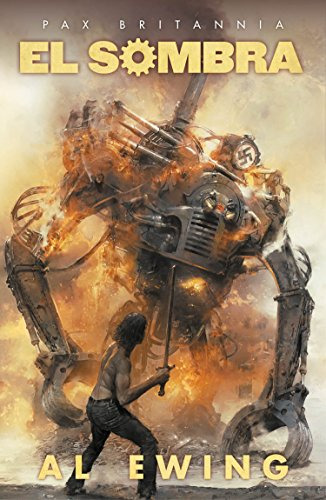
So now that I actually finished Pax Omega I can give my thoughts on the trilogy. In short: I like it! It's got a lot of incredible strengths and interesting takes on the material it pulls from, it's got a very rich setting and interesting characters to explore, in terms of what else I've read from Al Ewing's general work it's second only to Immortal Hulk for me. This trilogy may have actually convinced me that steampunk has at least some value as something other than obnoxious set dressing, and that is no small feat.
I got a separate post planned for El Sombra as a character because I want to write about his character arc and the trilogy's relation to his respective influences, but below are my particular thoughts on the books. Spoilers below the cut
El Sombra is easily the simplest of the three, and the most straightforward "pulp" novel of the three. For the most part it's 200+ pages dedicated to establishing the misery of Pasito, the vileness of the Nazis, and the character of El Sombra as he hacks his way through whatever bastards he can get his hands on. It has to do a lot of work in making sure we fully understand El Sombra's character before the next novels can get to work putting him on bigger settings in a supporting role, and in that it succeeds very well. It's a Zorro character stuck in a 2000 AD world of dystopian mechanized nightmares and fighting savagely to kill it, gradually learning that he needs more than just a sword and superhuman skills to do it.
One thing that sticks out to me about El Sombra is how grueling of a read it can be, especially in the first two chapters when the story's establishing the situation of Pasito nine years after the wedding massacre, through the POV of the story's villain. While there are many pulp stories that include Nazis as villains, I've never seen one that goes as in-depth into the sheer atrocities of Nazi regimes as much as this one. Ewing really spares no time conveying just how utterly wretched they are in many ways other than just ethnic massacres (and the massacres of the book are harrowing to read as well, no grisly detail spared), the many insidious ways totalitarianism corrodes the soul of all subjected to it, long before the Nazis actually start dying. It's incredibly disturbing and not at all out of line with the real atrocities perpetuated in history.
And it's made all the more effective because the book goes to great length to describe the many, many life stories of all those that get killed by El Sombra, whether irredeemably evil or merely misguided soldiers, which lends a lot of weight to them. He's not just tearing his way through cartoonish embodiments of evil, he's murdering people brutally, to our enjoyment, because painting Nazis as people is not the same as humanizing them, it only makes them much, much more horrifying than any doomsday weapon could ever be.
The scene in particular where El Sombra has to dash alone into a burning building to rescue children, children who are seconds away from dying, children he had to kill an entire squad of Nazis just to be able to rescue, children that he cannot leave on the streets because otherwise they will be trampled or killed by a mob, had me gasping and not wanting to turn the page out of fear, actual fear that he wasn't gonna make it.
"Zorro vs Nazis" is an incredible simple premise, and I don't think it could be done better than it was here. Very, very solid start, although I do recommend that you go in aware of just how brutal and disturbing it can get.

Gods of Manhattan was the first one I read, and contrary to El Sombra's more western and pulp roots, this very much reads like a superhero comic book centered around pulp icons. Out of the three it's the one I like the least, but it's a very good book, one that could easily work on it's own even without it being a sequel. It's considerably less harrowing of a read than El Sombra and instead much more based around meat and potatoes storytelling, showing how the building blocks at work here are being arranged, and a larger exploration of liberty and egalitarianism and political aspects of the works Ewing's pulling from. Gods of Manhattan is the trilogy's moral compass, contrasting to the simple revenge thriller in El Sombra and the science fiction anthology of Pax Omega, setting up the major players of this world before Ewing can knock them around for the final installment.
One of the things I like most about the El Sombra trilogy is the mix-and-match of properties. Doc Thunder, for example, bears many surface similarities to Doc Savage, but he functions mainly as a Superman figure. He wears a logo akin to Shazam's, he has a reputation akin to that of Captain America's, we later learn his real name is Hugo and he's the in-universe equivalent to Hugo Danner. As the most straightforward superhero of the setting, Thunder condenses the history of it's biggest icons into a single being. The primary Shadow analogue here is the villain, but the villain also shares more common traits with The Spider and Spider-Man, and traits of The Shadow manifest in two other characters (the titular El Sombra, and a character known in-universe as The Blue Ghost who functions as more of a Spirit analogue). There's a shapeshifting dead-faced supervillain by the name of Anton Venger, referencing the pulp hero The Avenger. The Lex Luthor analogue turns into Doomsday by the story's end. It's the crafting of an interesting new mythology from bits and pieces from a larger whole and there's enough rich content here to last for a whole franchise.
If I had one major problem with this book, it would be the character of Marlene Lang. Marlene functions here mainly as the Margo to Blood-Spider's Shadow, and naturally, she gets twisted to the extreme. While the story's demonization of The Shadow's archetype is grounded in a larger point about the dangers of dark vigilantism, it's treatment of not-Margo/Nita here is purely for the sake of reinforcing the Spider's own awfulness. The story demonizes her by painting her as decadent and sadistic and promiscuous, and the latter in particular is really hammered into you as something that paints her as evil and unlikable, which is really shitty. I expected better from Ewing and I don't think this is a decision he would have gone with had he written the story today.
Still, Gods of Manhattan is terrific and gets a very solid recommendation from me. But much to my surprise, my favorite of the books actually wound up being Pax Omega.
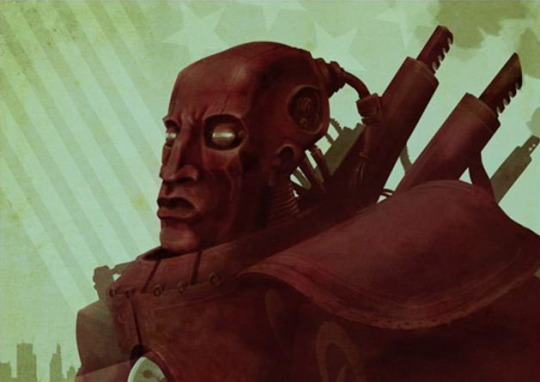
Pax Omega is an incredibly ambitious book, spanning the entirety of time from beginning to end, every chapter presenting a radical shift in setting as we jump through time periods of this world's history. It has a truly staggering amount of worldbuilding to get through and a lot of it is pure exposition. It's a one man sci-fi anthology, and while that's turned off some of it's readers, I liked it considerably better than the other books. It weaves together it's narrative threads incredibly well as it gradually gives you a sense of where the story is heading (and was always heading right from the first book) as wilder and wilder concepts get brought into play corresponding to the massive changes brought by time.
Despite how separate a lot of these stories are, they all come together, and there is not a single wasted chapter or page here. It's got fun thrills, it's got action, it's got harrowing descriptions and passsages (particularly regarding El Sombra's discovery of Berlin), it's got enough worldbuilding in here for entire shared universes and not a single dull moment. Pax Omega cements this trilogy as one of my favorite superhero universes as well as easily the best superhero novels I've ever read, although it's playing with a lot of images and icons much older than superheroes, and even weaves in a bit of meta-storytelling.
It's definitely the book I'll most likely revisit in the future, and while I don't think this is a trilogy that could work as well outside of it's literary format, I think there's a lot of interesting aspects here to be learned from by anyone who wants to tackle pulp characters, or superheroes. Very impressed with this one.
4 notes
·
View notes